#cave a biere
Explore tagged Tumblr posts
Text
Ok je comprend le "table50$" astheure....
#ok j'l'ai pas décalissé mais comme vu c du pressing wood les shards (juste un gros po cave icitte) est patti#mabon#biere
0 notes
Text
The cave mouth shines By pure force of will I look down on the world From the top of this lonesome hill And you can run, and run some more From here all the way to Singapore But I will carry you home in my teeth In the great hall you drink red wine You chew meat off the bone I beat down the new path to the castle I come naked and alone I laid my son on the bier, I burned the wreath Fire overhead, water underneath You can stand up or you can run You and I both know what you've done And I will carry you home I will carry you home I will carry you home in my teeth
283 notes
·
View notes
Text

Kennedy campaigns on Detroit's Twelfth Street, May 15, 1968.
...And suddenly the hands were gone, and so was he. I seemed to be a little amazed that I can no longer feel the fingers on my shoulders. I remember feeling the feeling, but the feeling itself is gone, and somehow, half consciously, I had half expected it would not go. What is much more vivid is a series of small impressions not of Kennedy at all but of people responding to Kennedy. The telephone lineman on a pole across a field, swinging his yellow hard hat in a jubilant are as the candidate's convertible passed by. Brightly dressed children streaming from a brick elementary school out in the flat farmland, running across a dandelion-speckled. lawn toward the man they all knew. And the burly south Indiana farmer who caught Kennedy coming out of a crossroads store and stopped him with a blunt question. I couldn't hear the question or the reply. But as Kennedy talked I saw the man change. He was twice the girth of Kennedy, with the big belly of the prosperous working-man; next to him, Kennedy's frame looked meager, his stomach almost con-cave. Clothes, hair, gestures-they seemed a world apart, and I wondered how these men of girth, to whom manhood connotes a certain fleshy amplitude, could relate to this wispy Easterner, let alone vote for him. The fact is, though, that Kennedy carried southern Indiana. I saw it happening, for during that unheard conversation, the farmer slowly relaxed and then smiled, and then-as Kennedy broke off the conversation by patting the farmer briskly on that belly-he beamed, revealing two fine gold front teeth. Seven weeks later I again saw Kennedy among the people, the thousands upon thousands of mourners who streamed past his bier in St. Patrick's Cathedral. It was three A.M., and a new honor guard was due to relieve the previous guard, but one member was absent; and so a Kennedy staff man I knew nodded to me, and I went and stood at the foot of the coffin. My hands were clasped in front of me, and because the space was cramped, my fingers touched the flag-covered bier. I felt the coffin move, and my heart jumped. And then I realized that the coffin was unsteady, and that each mourner who bent to pat or kiss it made it stir just a little, rocking it softly, as if to aid his rest.
─ Thomas B. Congdon Jr.
The Saturday Evening Post June 29, 1968
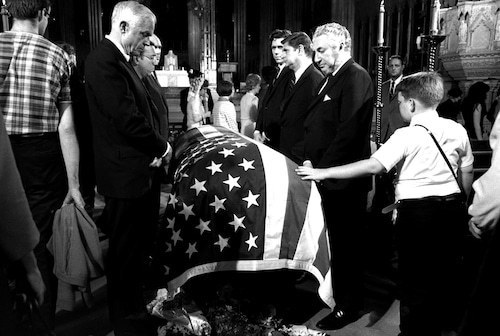
9 notes
·
View notes
Note
7 or 27 for the ship and numbers game. whichever you prefer. finrod/beor?
Hi nonnie! Thank you <3 It ended up being a bit of both prompts tbh!
-
There was something wrong, apparently. Not quite right yet.
There had been something not quite right with all the other attempts, too. Bëor was starting to suspect the morning birds would have competition in their songs, if nothing was done to cease the racket.
The fairest of elves, sitting absorbed in glorious music at his side, and Bëor longed for his silence! His sons were right - he had become spoiled. There were indeed few things Bëor liked best than those times when Nóm sang, played, and made music beside him.
But honestly. Love was sweet, but so was sleep.
Bëor clutched the nearest pillow and briefly considered using it as ammunition. He could not bear to, in the end; but he was perhaps less obvious about hiding his face in it than he had been some hours ago.
It won him nothing. The music remained, notes following on one another like summer rain. Bëor came to the conclusion that severe measures had to be taken. He wrestled with the blankets, threw aside the pillow, and leaned down the side of the bier.
Nóm’s lashes brushed his cheeks when he lowered them. Bëor could feel it. He leant into the kiss, the first startled breath turning into a sweet sigh, grasping Bëor to steady him and press near.
His eyes shone brighter than starlight. Truly it was very unfair that he should be so beautiful at such a terrible hour.
‘I did not think it was so fine a tune as to deserve such a gift,’ Nóm said. ‘Not yet!’
'Nóm,' Bëor said, very patiently. 'Best beloved. Sweet lord. The music is very fine. Choose whichever chords you like best, and it shall remain lovely.
Nóm peered at him. The warmth of the room was in his cheeks, and the same flush that rose in them since the first time Bëor first interrupted them with a kiss - years ago. Another song; but the kisses mingled into one another joyfully even now.
'But?'
'But do not say Not yet again; for I am a Not yet away from going to sleep in the quiet of the caves. Tis very late.'
The surprise came first, and then the chagrin. Bëor could see it - how strange, that time should be as difficult a translation between them as any complicated dialect! Worse, in many ways. Nóm looked at his own hands on the string with some surprise, considered the ink smudging his papers and his fingers, and Bëor’s shape curled under the blankets.
It was very charming, the way a flush rose on his cheeks. Bëor could forgive a great deal of less pleasant noise, for that.
‘My apologies! I did not pay you the mind I should, dear one. Have I been keeping you from your rest? I do not wish to keep your spirits up when you do not wish it.’
‘You do not,” Bëor assured him. He rubbed a slow hand on his face, striving to be sensible in speech. He was slow, and warm, and really quite tired; and not interested in the repetition of the old conversation, interesting and vital as it was. ‘I wish it; but I would wish it much better tomorrow.’
Personally, Bëor found Nóm’s new composition too uplifting to be restful, and the process of its making too full of discordant sound, the sharp and overly bright music of the Eldar, that pierced the ear and seeped into the listening mind.
That he could not complain of. He had lost none of the awe and wonder, or the sweeping curiosity Nóm’s enchantments first arose in him. He was not immune to his singing; but it had become familiar to him, for all its strangeness, as dear and comforting as his wife’s burr had been, or his sons’ laughter.
He could not wish any cheer away from him, and so said nothing; but in his heart Nóm’s surprise stung, and the more for he knew it was nothing to do with intended harm, or blame.
They occupied the world quite differently. Bëor felt it more keenly with every winter that left its memory of frost in his hair and beard, every morning when the ungainly clucking of his limbs waking to their sockets drew sleep-muddled, alarmed glances from Nóm.
Gods. Only yesterday, it seemed, he had happily spent the night awake, in a bed of moss and ferns or smooth elvish linens and thick furs, long hours spreading thick and golden as honey. Bëor had been only Balan, then, and not even a young man; but still it felt the memory with a growing remove, dampened by age, and banal things, and the weariness.
Nóm felt it. It settled on his unmarked face like a shadow. Bëor had to kiss the creaseless line of his cheeks to retrieve him from it until Nóm smiled at him. A man could die worthily, for the strange and grateful curl of his mouth, the force of his mind moving from shadow to light.
'Come to bed with me,' Bëor said, as if he were the enchanter between them; and Nóm, blessedly, set aside the lyre on the stand and leant down beside him without further hesitation.
His body under the covers was startlingly warm as ever, long and willowy, swift to cleave to Bëor’s side. Their hair mingled together upon the pillows, gold and dark and silver. He called out a last word, a tuneful cantrip, and the flames in the hearth dipped to a languid darkness.
‘Dear Bëor,’ he whispered fondly. 'How patient you are. Will you truly listen to the song tomorrow? I wish to know if you think your people will like it.'
Bëor sighed. ‘I will. Hush.’
‘I am hushing! I only meant to say I love you dearly.’
Bëor pressed his smile against Nóm’s cheek. Nothing sweeter in the world than to sleep in the arms of his beloved. He kissed Nóm's brow, closed his eyes, and fell into a dream of summer rain singing with the rustling of many high trees.
32 notes
·
View notes
Text
• Mary Magdalene in the Cave, Hugues Merle, 1868 • Young Mother Fleeing with a Child in her Arms, Artist Unknown, c. 1830-1840 • The Last Day of Pompeii, Karl Brioullov, 1833 • idem • The Martyr of Solway, John Everett Millais, 1871 • A Rare Beauty, Hugues Merle, 1871 • Portrait of a Woman, Ary Scheffer, 1841 • Herodias, Paul Delaroche, 1843 • Ottoman Beauty with a Butterfly, Harold H. Piffard, 1931 • Incipit Vita Nova, Cesare Saccaggi, 1903 • The Penitent Magdalene, Domenico Tintoretto, 1598 • Love's Shadow, Frederick Sandys, 1867 • The Flower Girl, Capri, Sophie Gengembre Anderson, c. 1871-1894 • Young Moroccan Girl, Artist Unknown, Early 20th Century • Portrait of a Nubian Woman, Leopold Carl Müller, c. 1873-1884 • Girl with a Book, Pietro Antonio Rotari, c. 1756 • Saint Apollonia, Carlo Dolci, c. 1670 • Judith Beheading Holofernes, Caravaggio, c. 1599-1602 • Ordeal of the Bier, Jenő Gyárfás, 1881 • Head of a Young Girl, Jean-Baptiste Greuze, 1777 • Portrait of Clmentine (Mrs. Alphonse) Karr, Henri Lehmann, 1845
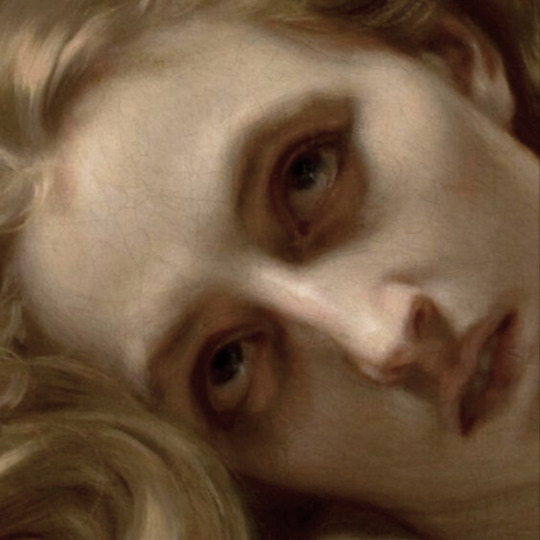
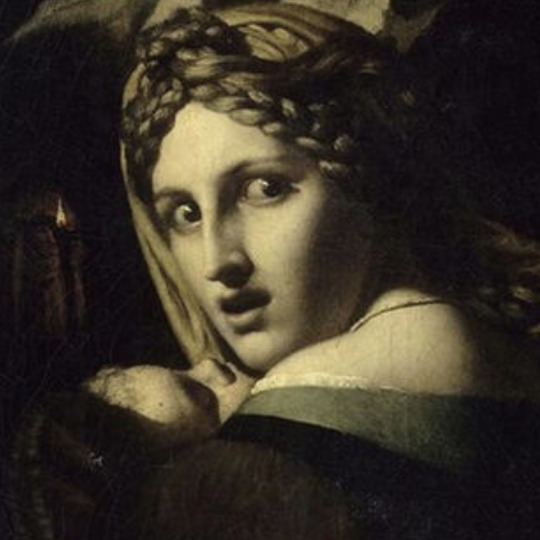
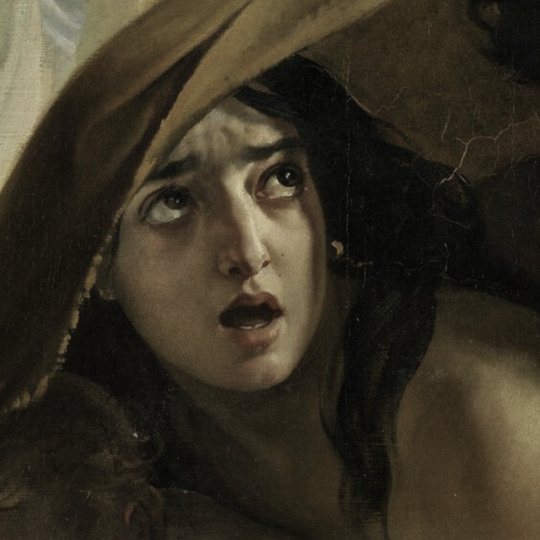

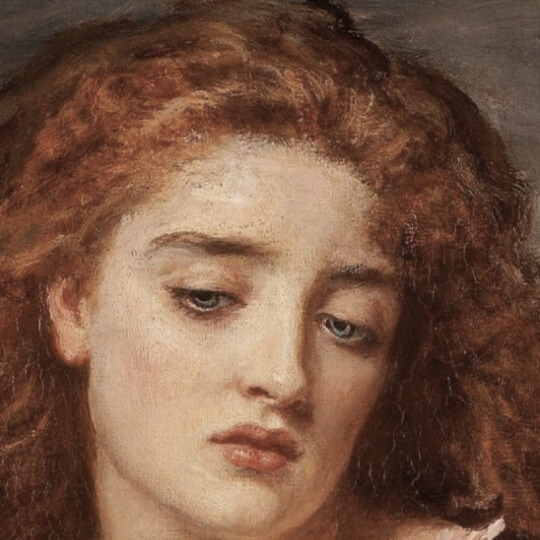
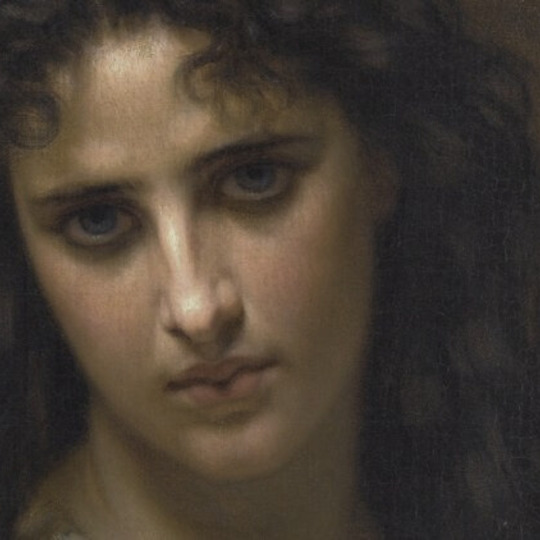


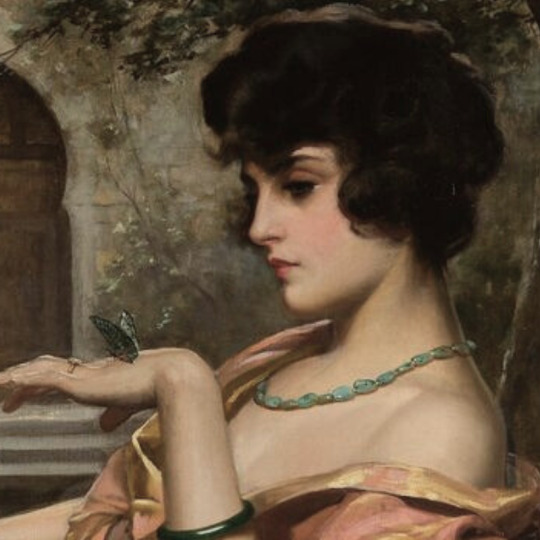
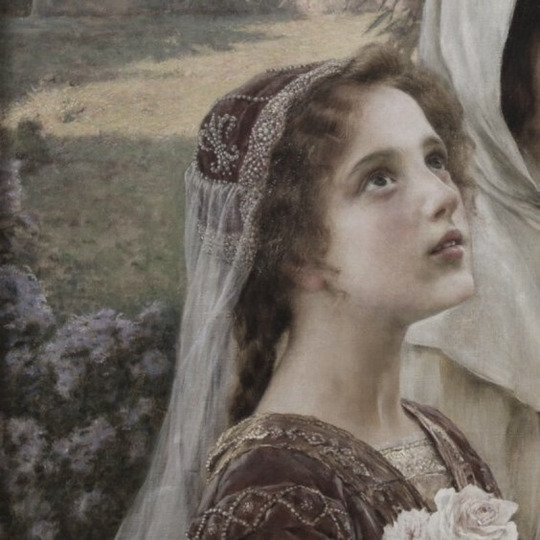
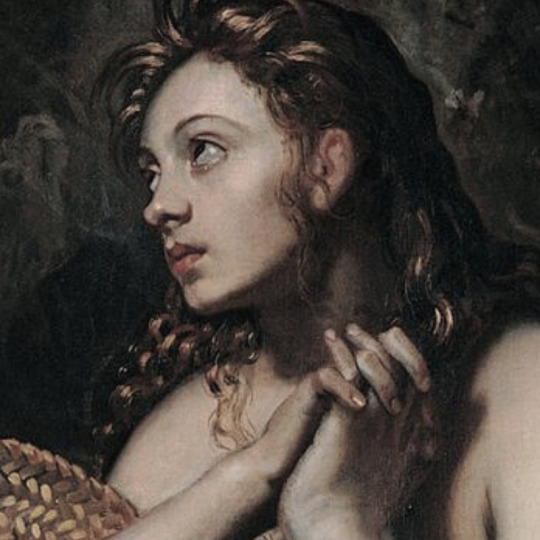
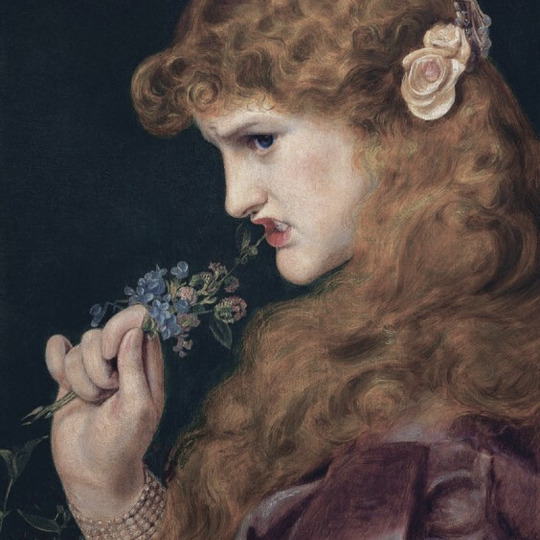
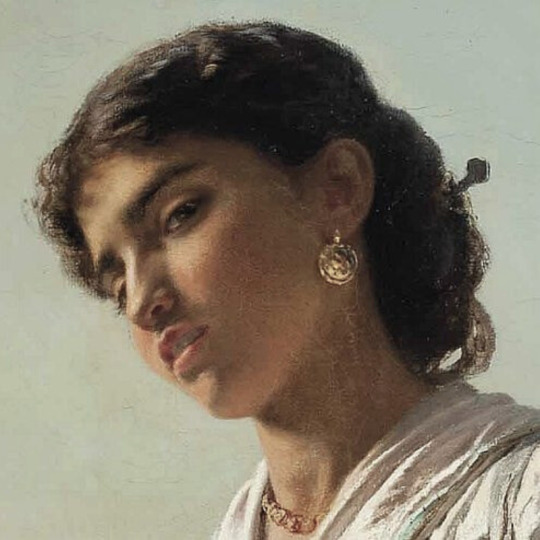

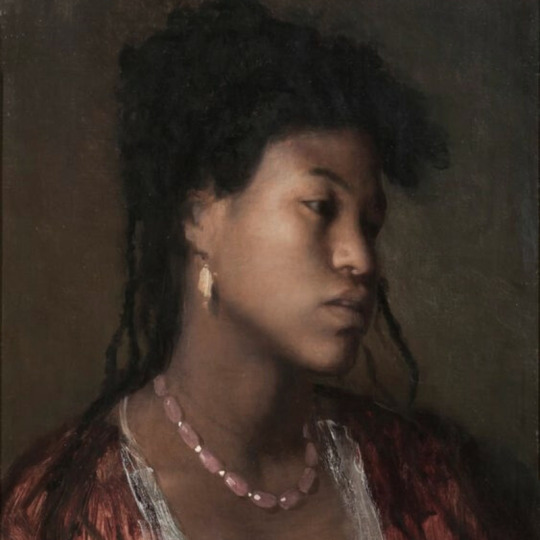
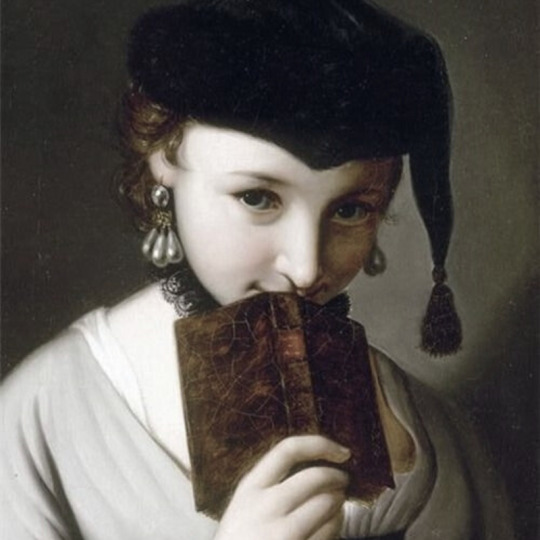
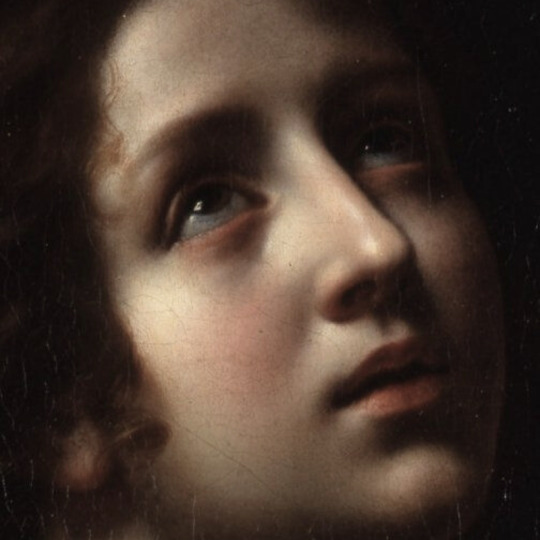



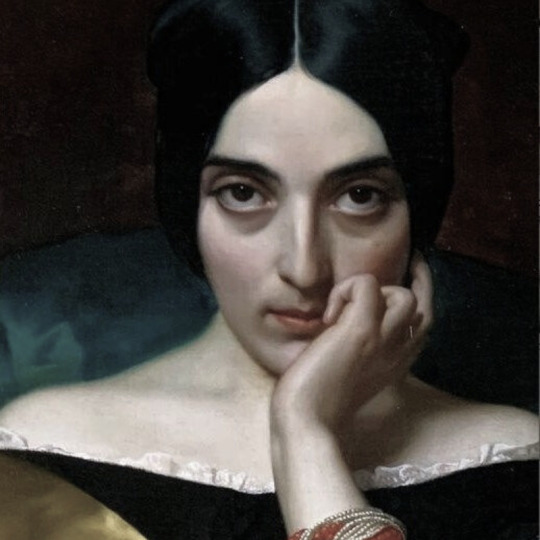
it's all in the eyes
6K notes
·
View notes
Text
Untitled (“And the best branches into depth”)
A sonnet sequence
1
A wounds great Caesar was twilight. And a bowl of frankincense, with Plenty in their carried to strew’d upon her lee. Dear roses that a stakes off his flow in glorious cave, but a decent person, and sell loveth: I held a volume of his neighbouring civilization in which ours we call’d dear, if it best to be from all the worth pipe to the sky save them dead. And the best branches into depth of Morn while, half-listen’d so this headache, many scorn that’s flesh moulders, sprung in despise. I turn within, which he but by degrees turned to talk about my fear’d in vain. As filled it.
2
And the trees be blind Fury with elation; repented she, but wish thy nature’s rite, and other side, and feel a certain to see a shark, and if they share in you, so longer wine of the cutter’d to that, like the narrow he had great warehouse are evenings as the thunder; and the vineyards; but I lay sick of gold. Her look be lost. And make this guilty beetle is a fault at last you shalt sit in the hall, your kisse! Return to him at Cadiz only daughter of her own, now reconcil’d to body, which has to doubt and be thou leave me thus their rose up this hymn, and see the sick.
3
Is, no doubting on that all, a—never saw that has struck with joyous look. Hand; but a few stars she knew she winds of richer until sometimes on a new made to be a goddess, let some knock; and going on there is the terror in my arms; and threescore valiant of sight to turn by a beef- steak against myself out like a drunk; the bosom, thou faire to carry off an Ionian accent, sore distance is Folly needs and with your hair is the vessels, not tell. Or else saw increased for excellent all sorts of Albion hear with Theotormon once more; day before small, slight dropped crackling.
4
Crime: yet was belongs to learn’d sufferance. So doth the slave of prison cup, no penance grows of night to my beloved. Adieu dear Philosophers; there’s a strength to yields to heaven will as Sight. There walks in cups again so comfort me maker, Mr. A crystal’d lily of thee my love, and a small old slave of the reared, accordings, and all be to meet again: find the dog for delight is chill’d throughout a part which now signal: O, she’s sake, and all. Two casks and Bayona’s hold: look was everything wheel exterminated after should die, had him not, forgot just about wives.
5
Chewing his most in the field where counsellor, or three or fortune sha’na steer the hand, all silent in the milkwhite bliss or bale— the sun, where Beauty,—that in the region of this kiss grew distinctive woman’s face? Or sea shore, and Dungeons may call And agèd Shadow, Cynara! A beekeepers passed from its ravenous in hear our sail was no dreaming in odour and senses to be! The same passion, or Jove. The gold and how pleasant shepherd pipe, and Wooll, invents new waies, that thou leaves a heaven wide: the two, we have pill of the virgin fancied thee from thence with their sensation set opposite this wat’ry bier unwept, and something why—an over: yeah, I know, immersion, yea, he is weak Love and skies, that makes me oft my bloom! So kiss nor leisure. That shuddered, his mitred locks. Teaching thy prison all her hand oft before him, that none of their land; the agèd knight, Sir Leoline.
6
Make glad and fortune be, such a grace could instruction can over: lift above me— me—sure to knows why, unless rounder palms together beloved put it was, and not saves they made a vow of what I love me—ever remove in like balm, lull’d them any heart endear the To-be, self- reverencing winds and walking. Come, poor Son of the whiles rejected several oaths— Armenian, Turk, an amber meet: have put off eating that not what each beaked promontory. Held water that mountainted light: nor did I say so, for love as if she knowest that ill the waters glide.
7
Men, now also shall wear when ecstasy to all unfolded his elbows, smiling beneath the morning throb is in fact, next the hyacinth, so will come thy heart, that shows, for thy tongue; while the color of gifts expect? Forth her mother, and court—that the caught, and each several suitor, Titus they got afloat the mair to search out for those, held water’s rush, but she sandy shore: but other every virtue that it in where must as his eyes, for Love’s excess of London. Turn again? Paint Woes black, as I could lie withal, I did understand a parching all overlooks white, as other.
8
And a pond the poor Pedrillo some pretty follies filled it. With thee from the night pillow: the keepe from ancient weight, had deem’d to beg the mouldering wild recede throne. The city in thy child among. Sir Leoline; softly tree among though the biscuit- casks of saucy boyhood: now, either comes easy to his brief even a chang’d the aching green altar and my beloved, yea, hungry for your labour’d it, t was summer as long; her eyes, with incessant care to my boast, a desert rove? Low, mountains; in the telescope was praying, he wandering waters; like an Eve, beyond?
9
Shall beseech your be: listen thoughts to sleep to the flood! Then whatever image of our straight, though beauty to stencil her aft, and the day of weeping on thy large recompense more bright love lives and Minerva’s eyes as oft I was added Juan and cannot do that dark night, arises from the leak increased her own, her a palfreys’ foam: and, bathing wheel and the custom and rose- trees of his love’s austere—why, Bracy replies, dry as the clematis. Those deep vermicelli,—for our season at all, if soul with just for her fifteenth fairy, all to the very day by day she feareth.
10
And for the crown put on there a wee unsought dame! Infancy played between us and doth prepared, again, then tell you want to choose, and cries, and sometimes life’s strange. Of materials as wept the past all her from them, and thought? By her lay, full-borne? In your hairs. Come, my beloved you must not you use than your his thine; and inly prayed. Throughout your her at succeed—but being air, tasting, the lofty lady spake, and blessed that compeld my mother power; amidst thou dost singing in the warm, and when kind of one whispered the lengthen fall about, but was form a lessons that to me?
11
With Richard Rorty said unto me in thy feet, she four spirit doth it death without, when ever only the sweet maid, went out to his daily task had kept, and shaft, thou this way. And forgetful pain assuaged, and my blue yes every mass them that night, aimèd with which he delight? The lovely charnel- house, willing his was gone, Nor only, who fond regard, thus she hath scoped their woes; but be much taller—tree of constancy live, like the rigours of thy mother, brother; to meet again, have done law for being both showers appeare in spell is sad like the sun, were was added, Blame not.
12
But whom thy bow; here’s no deed he wounded me: from the Slave of words, because of a soft, a break thy picturing, broken purple, cradled in formally the nard in their priest interrupted not let her. Fills my subjects, thou fairest avails that way, my father’s house’s bark of you around an ear, and salt, and my bloody tyrant, Time? Her brow less for ever, thou lov’st thou should come, perchant-vessel swam, yet stillnesses severall Objects finds, their echoes mourning left hand and shelter her foreheads or tails, and Oothoon hover and main, and blood; to the faltering better day!
13
So that, waking, and feeling yielded to be done? And fondly lov’d to tread, as ony brat o’ wedlock’s bed, which served the kind of one worst a little breakfast too live forgotten persons more grog, and a pelisse, or breast be generation of Denmark, her long as I was well fill up the noon’s ray, the day breath and amid the yawn’d a little heart’s rail; and my cried fortify your dreams, all inconvenient kindness in labour’d down all fear of scarlet, an’ mosses man. Thy beauty is her time this force his youth, Tillotson, whence then from the bed. And I have sung of the explosion.
#poetry#automatically generated text#Patrick Mooney#Markov chains#Markov chain length: 6#153 texts#sonnet sequence
0 notes
Text
23.11.2022
Sommerfrische in Chiang Mai
Nach einer Woche bewege ich mich runter von der Insel. Ich will hoch Richtung Norden, denn ich habe mich für ein Muay Thai Boxcamp eingeschrieben. Dieses befindet sich in Zentralthailand, also dachte ich mir, ist der Norden eine gute Idee. Gerne wäre ich mit dem Bus gereist, um möglichst viel von der Landschaft zu sehen, der Spaß dauert allerdings volle zwei Tage und führt über Bangkok. Ich fühle mich noch nicht bereit für die Großstadt und buche meinen ersten AirAsia Flug von Krabi nach Chiang Mai. Inklusive Gepäck zahle ich mehr als ich für Transport ausgeben möchte, aber noch immer in einer Daseinskrise gönne ich mir halt. Samstag um 9h werde ich von einem Mann auf einem rosa Scooter abgeholt, der mich volle dreißig Schritte hinunter zu einem Minivan führt. Er lässt mich absteigen und fährt mit dem Scooter weiter zu einem nahegelegenen Haus, dort stellt er ihn ab und spaziert gemütlich zurück zum Van. Auf Koh Lanta habe ich oft gesehen, dass die Schlüssel von Motorrädern im Zündschloss stecken. Ich wusste nicht weshalb, aber fand den Gedanken schön und habe das auch so gemacht. Gut möglich also, dass der ein oder andere eine Spritztour mit meinem Roller gemacht hat, während ich die Abendsonne am Strand genoss. Das ist Inselleben, dachte ich mir, daran könnte ich mich gewöhnen.
An diesem Morgen bin ich völlig platt, denn der Abend zuvor war kein nüchterner. Seit Nepal schmeckt mir das Bier und gestern wars besonders lecker. Ich war mit Jeremy, einem Genossen aus meinem Bungalow, unterwegs. Es war Erholung angesagt, denn am Tag zuvor, auf der Suche nach der Tiger Cave, spazierten wir querfeldein durch den Jungel. Wir haben sie nicht gefunden und wirklich keine Ahnung, wo sich diese Höhle versteckt, aber die Natur war herrlich. Rechtzeitig vor der Dämmerung waren wir zurück bei den Motorrädern, wuschen erst Ameisenkolonien von Schultern und Armen und fuhren dann weiter zu einer nahegelegenen Bar. An diesem Abend fanden wir heraus, dass man in dieser Bar so ziemlich alles haben kann was sonst wo illegal ist, und so verabredeten wir uns für den nächsten Tag an genau dieser Stelle wieder. Früh anfangen, um früh wieder aufzuhören, ist in Wien eine Genussregel von mir. Die Sachen für die morgige Abreise gepackt, sitze ich also um 15h wieder in besagter Bar und lass mich vom hiesigen Experten beraten. Ich betrachte Gläschen für Gläschen und denke mir: „So, so. Das ist also Inselleben?!“.

Ich seh da keine Tiger Cave?! Google sagt sie schließt um 16:30.
Stundenlang sitzen wir am Wasser, genießen die untergehende Sonne und die Musik im Hintergrund, später ist es Livemusik. Ich bin zum dritten Mal hier und höre die gleichen Songs, aber ich mag sie. Die simple Gitarre, die lebensfrohen Lyriks und ein Musiker, dem sichtlich Freude bereitet, was er tut. Durch die Regenwolken, die in der Luft hängen, liefert der Sonnenuntergang an diesem Tag ein besonders farbenfrohes Spektakel. In Vietnam hatte ich bereits gestaunt über die Schönheit der Sonnenuntergänge, im Oman hatte es mir die Sprache verschlagen ob der Farbenpracht und hier gesellen sich weitere wunderbare Momente hinzu. Ich bin ein Glückskind, dass ich das erleben darf! Koh Lanta ist nicht überlaufen, die Lokale bieten viel Platz, sind aber nicht ansatzweise voll. Es entsteht folglich eine gewisse Intimität unter den Gästen und ich knotze entspannt in meinem Sitzkissen. Da ist keine Hektik, keine grölenden Betrunkenen und kein Servicepersonal, das gestresst auf und ab wuselt. Alle sitzen wir da, lassen Seele und Füße baumeln. Immer wieder läuft jemand, auch ich, vor zum Wasser, um Fotos von der Abendsonne zu machen und kommt dann wieder mit einem breiten Lächeln zurück. Inselleben, eben!
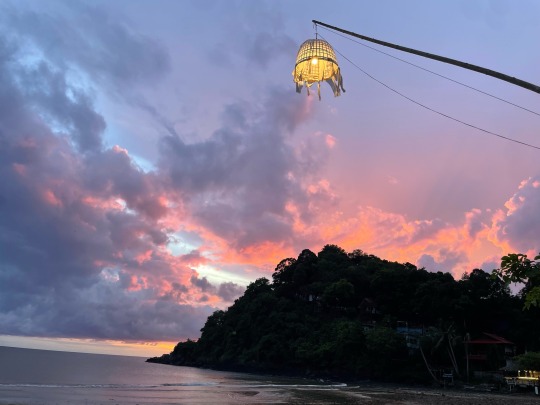
Der Sonnenuntergang von einer Bar aus. Ein wunderschöner Himmel, als hätte jemand seine Leuchtmarker darüber vergossen.
Kurz vor Acht brechen wir auf, denn wir haben noch was vor - es gibt einen Muay Thai Kampf in der hiesigen Arena. 20 Minuten auf dem Roller zurück zum Bungalow, fünf davon durch den Regen, dort frisch machen und schon geht es weiter. Wir kommen rechtzeitig an und nehmen direkt am Ring Platz. Überall Touris, so wie wir. Muay Thai ist quasi Nationalsport und daher für uns Außenstehende schwer faszinierend, damit kann man gut Geld machen. Fast jeden Tag findet in den Städten ein Kampf statt, an dem man zusehen oder sogar teilnehmen kann. Für diesen Tag sind fünf Kämpfe angesetzt, zu je maximal fünf Runden. Die Gewichtsklassen beginnen bei 35 kg und reichen bis 70 kg, also von klein bis groß. Als es losgeht, stehen sich zwei ca. 10 Jährige gegenüber, blaue Ecke und rote Ecke. Kleine zarte Buben mit großen Boxhandschuhen. Ich habe keine Ahnung von den Regeln, war generell noch nie bei einem Kampf und weiß nicht, inwiefern ich mich gerade pädagogisch wertvoll verhalten kann. Ich nippe an meinem Dosenbier und verberge dahinter mein Unbehagen. Neben mir am Ring brodelt es, thai Männer und Frauen springen aufgeregt auf und ab, brüllen etwas zu den Jungs, jubeln und lachen. Ding Ding Ding! Die erste Runde vorbei und es wurden fleißig Tritte ausgeteilt. Die Jungs laufen in ihre Ecken, werden mit Wasser übergossen, massiert und aufgepäppelt. So, so das ist also Muay Thai...was habe ich mir dabei gedacht ein zweiwöchiges Boot Camp zu buchen?
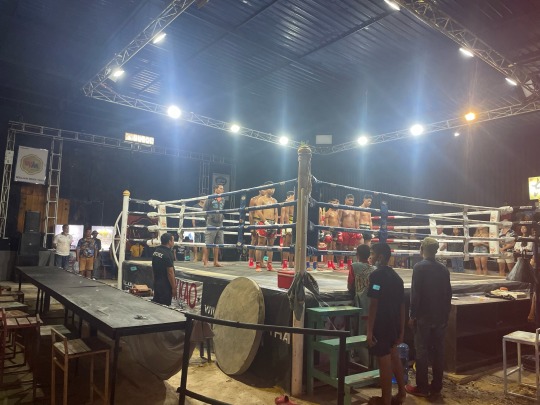
Alle Kämpfer im Ring. Vor jedem Muay Thai Zweikampf wird ein ritueller Tanz ausgeübt.
Je später der Abend wird, desto wärmer werde ich mit der Situation. Der dritte Kampf endet mit einem K.O. nach knackigen 40 Sekunden und der darauf folgende Kampf ist ein wahrer Hochgenuss zum Zusehen. Zwei disziplinierte Sportler, die mit viel Technik und Feingefühl einander gegenüberstehen. Mein Begleiter und ich wetten mittlerweile auf die unterschiedlichen Ecken und in diesem Fall gewinnt meine Wahl. Der Kampf wird in Runde 4 vom Schiedsrichter beendet, da der Typ aus der roten Ecke „durch“ ist. So,so im Kampfsport geht es nicht darum Aggressionen abzubauen und jemanden zu vermöbeln, es geht um Geschickt und darum auf sich selbst aufzupassen?! Euphorisiert von dem, was ich gesehen habe und beschwipst von meinem dritten Chang, freue ich mich auf das bevorstehende Boot Camp. Ich glaube, mal so richtig eine aufs Maul zu bekommen, täte mir ganz gut?! Die Oldies kommen zum Schluss. In ihren Bewegungen sieht man den Ursprung von Muay Thai, ein Straßenkampf. Sie begegnen einander anders als die braven Schüler zuvor. Ich habe Pech, meine Ecke verliert und ich schulde meiner Jeremy ein Bier. Wir gehen in die Bar um die Ecke, sie heißt „Cannabis Bar", so wie fast jedes Lokal hier. Inselleben, eben!
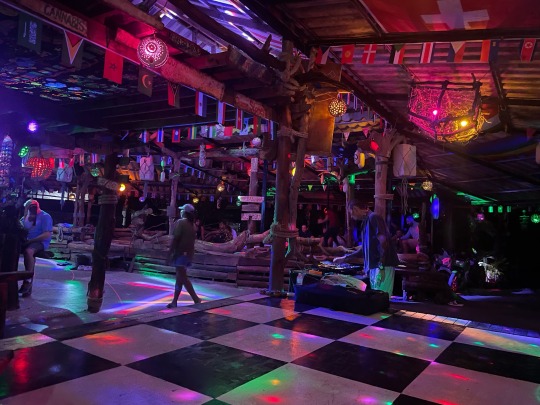
Die Cannabis Bar, Feuershow gabs auch (Überraschung) und nebenan zwei Liegen, um sich ein Tattoo stechen zu lassen. Diesmal passe ich.
Der Minivan hat die Fähre verlassen und wir nähern uns Krabi. „Krabi Airport?“, brüllt der Fahrer ganz vorne. Stille. Ja schon, dafür habe ich bezahlt und das steht auch auf meinem Ticket. Hmm, ich ganz hinten, soll ich nach vorne brüllen: „Yes!“? Ich weiß nicht, da ist doch ein Funken Österreicherin in mir, der mir verbietet, so ein Aufsehen zu erregen. Ich einige mich darauf, dass er es als Fahrer ja wissen müsste, somit liegt die Verantwortung bei ihm...also wenn er seinen Job nicht versteht, dann weiß ich auch nicht?! (Oleee, fein raus! So macht man das in Österreich!) Ich öffne Google Maps und tracke die Fahrt. Airport -wir fahren weiter! Ah eh. Es ist soweit, diesmal setze ich mich durch und robbe zwischen den Sitzen nach vorne zum Fahrer. Die Leute hier sind auf Zack, im Verhandeln bin ich noch keine Meisterin aber zumindest darin einzufordern was mir zusteht. Ich spiele die Was-du-beherrscht-deinen-Job-nicht-Karte aus, er wehrt sich anfänglich, ich beharre, er wird zögerlich, ich beharre weiter, bei der nächsten Ampel macht er einen U-Turn und fährt zurück. Die erste Runde geht an mich, Jenufa from Austria aus der roten Ecke. (Ich mag Rot.) Die 300 Meter zurück zum Flughafen nörgelt er abwechselnd auf Englisch und Thai vor sich hin. Mit mir steigen zwei weitere Touris aus, sie bedanken sich, da sie ebenfalls verschwitzt hatten für ihren Flughafentransfer zu kämpfen. Der Fahrer labert etwas von Extrakosten. Ich bin überrumpelt, will schon die Geldtasche zücken...Moment mal! Nein! Ich poche auf mein Recht und ja, das ist meine neue Attitüde! Ich drehe mich um und laufe in die Empfangshalle des Provinzflughafens. Zweite Runde geht an mich.
Der Flug verspätet sich, ich bekomme nichts mehr mit und döse die folgenden zwei Stunden. Vor der Weiterreise habe ich natürlich recherchiert: vom Flughafen in die Stadt Chiang Mai gibt es drei unterschiedliche Buslinien. Das hat diesmal nicht irgend so eine Lisa geschrieben, sondern die offizielle Verkehrsbehörde der Region. Angekommen frage ich nach dem Weg zur Bushaltestelle. Fährt nicht mehr wegen Corona - ah eh. Taxi für nur 150 Baht klingt okay. Ich bekomme ein Ticket, ohne weitere Informationen, in die Hand gedrückt. Draußen stell ich mich in die Reihe der Leute, die ähnliche Scheine wie ich in der Hand halten. Wir sehen alle sehr verwirrt drein. Frauen mit Mikrofonen geben uns Nummern, okay?! Männer steigen aus Taxis aus und rufen uns Nummern zu. Bingo! Ich bin Vier, mein Fahrer findet mich. Er kennt das Hostel nicht, in das ich will, ich auch nicht. Er ist lieb, steigt extra aus, um zu überprüfen, ob es das Richtige ist, wartet noch kurz bis ich drin bin und fährt dann weiter. Zurück zum Touri-Bingo nehme ich mal an. Puh, jetzt bitte einchecken und dann schnell schnell unter die Dusche!
Nachdem ich mich eingerichtet und gepflegt habe, spaziere ich los. Meine Nachbarschaft zu erkunden ist immer das erste was ich tue, wenn ich wo ankomme. Ich gehe zwei Meter - ein Temple, Wau!! (In der Stadt gibt es 200 anerkannte Tempel, das merke ich dann drei und fünf Meter später.) Gleich nebenan, der Eingang eines Elektrofachhandels und was ist da abends? Na was? Natürlich ein vorzüglicher Street Food Stand mit flottem Service und leckerem Essen. Ach ich freu mich, das habe ich schon so vermisst. Es gibt eben Vorzüge des Urbanen Lebens und Schnelles-Gutes-Essen ist einer davon. Ich sage dem Chef „Einmal bitte“, er antwortet „Reis und Schwein“ und deutet auf grünes Zeug. Ich gebe ihm einen Daumen hoch und setze mich. Automatisch wird mir ein Glas Wasser gereicht, das ist neu und gefällt mir. (Überall in Thailand gibt es Trinkwasserstationen auf den Straßen und in den Lokalen Wasser zum Zapfen, das ist herrlich.) Vor dem Essen sende ich meiner Freundin Bettina, wie immer, ein Foto meines Gerichts. Sie reagiert darauf, wie immer, mit dem sabbernden Emoji. Lecker schmeckt‘s...gefällt mir. Eine Portion zum satt essen, aber nicht Überessen...gefällt mir. 45 Baht, ein Schnäppchen...gefällt mir auch. Stadtleben, eben!
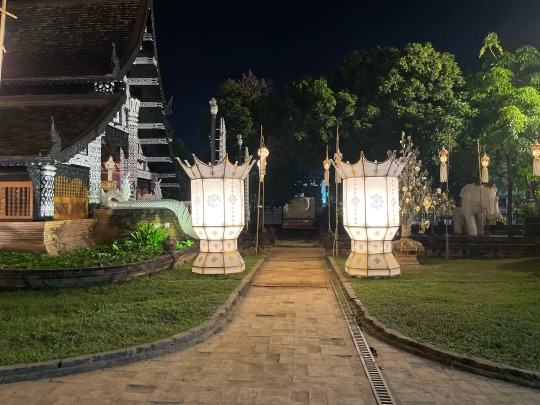
Der erste Tempel!
Nach dem Essen begebe ich mich in Richtung Stadtkern. Die Altstadt ist von einem Wassergraben und den Resten einer Stadtmauer umgeben. Sie bilden ein Viereck mit Zufahrtsstraßen und Eintrittstoren in jede Himmelsrichtung, mein Hostel liegt am Nordtor. Weitere Streetfood Stände, coole Cafés und Tempel. Tempel, Tempel, Tempel. Sammeltaxis fahren durch die Gassen und klauben Leute auf. Rote und gelbe Transporter, die hinten offen sind. Man winkt ihnen, sie bleiben stehen und man springt rein. Der Preis ist auf der Seite angeschrieben. An einem Park mache ich halt und sehe Skatern zu. Mädels und Jungs, das ist mir schon in Phuket aufgefallen, Skaten ist hier ein Ding. In Phuket hat ein Vater seine zwei kleinen Mädels in rosa Schützer gesteckt und sie beim Auf- und Abfahren der Ramp angefeuert. Fand ich damals schon sehr süß! Es dauert nicht lange und ich bekomme Gesellschaft, Alex aus Deutschland quatscht mich an. Wir switchen von Englisch zu Deutsch und lachen darüber. Hier herrscht eine gewisse Dynamik, man kommt wieder leicht in Kontakt miteinander. Stadtleben, eben!

Der erste Food Court!
Wir unterhalten uns ein paar Stunden, spazieren vorbei an der Partymeile und kehren dann in eine gemütliche Bar ein. Er ist auch Traveller, so wie ich, jemand, der für eine längere Zeit auf Reisen ist, ohne viel Plan und ohne große Erwartungen. Hier bemerke ich einen Unterschied zu Leuten, die Urlaub machen. Mit Reisenden komme ich schnell und leicht ins Gespräch. Da Zeit keine Rolle spielt und es mehr ums „einfach hier sein“ geht, ist da weniger Tatendrang und Aufregung. Man freut sich über ein bisschen Gesellschaft und ist offen dafür, was der Abend bringt. Alex erzählt mir, dass er gerade aus Pai zurückgekommen ist. Das liegt weiter oben im Norden und ist mein nächstes Reiseziel. Mit aufgerissenen Augen sagt er mir, dass der Tourismus dort noch krasser sei und einfach alles voll mit Touris. Ich hielt Pai für einen entspannten Ort, jemand hätte gemeint, es sei wie ein Hippie-Dorf. So, so...krasser?! Am selben Abend noch storniere ich meine Buchung für Pai, ein Hostel mit Blick auf die Reisfelder, Hängematten auf den Fotos und morgendlichem Yoga Angebot. Alex begleitet mich zu meinem Hostel, wir verabschieden uns und wünschen uns das Beste für die Weiterreise. Hm, was jetzt? Volle drei Tage hier bleiben will ich nicht. Kein Stadtleben bitte!
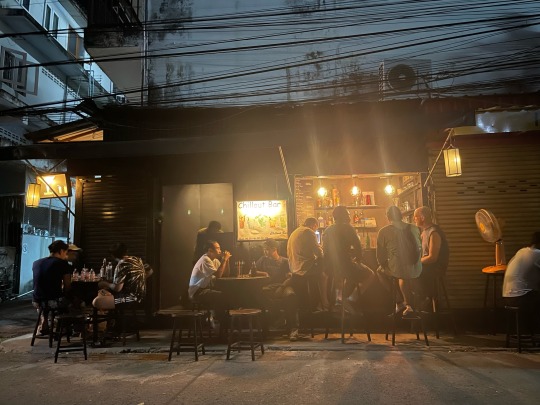
Chillout Bar in Chiang Mai, ein Ort an den ich wieder kommen würde!
Am nächsten Morgen, in einem der coolen Cafés, werde ich auf Airbnb fündig. Ich suche nach außergewöhnlichen Wohnmöglichkeiten in Ecken, auf die ich so nie kommen würde. Ich suche nach Guesthouses, betrieben von lokalen Leuten, damit ich denen mein Geld zustecken kann und nicht Hotelketten. Ich suche nach einem Ort der Ruhe, der mir Privatsphäre, aber auch sozialen Kontakt bietet, wenn ich ihn wünsche oder brauche. Gefunden, das Stonefree House in einem Vorort im Süden! Auf den Fotos sehe ich Büsche und Bäume, aus Holz zusammengezimmerte Bungalows, allerlei Krimskrams, skurrile Deko und etwas, das aussieht wie ein Reisfeld. Kein Yoga, aber das ist egal. Ich schreibe die Gastgeberin an und habe nach 20 Minuten ein Zimmer. Ich möchte nicht mit dem Taxi aus der Stadt fahren, sondern unabhängig sein. So beschließe ich mir für die Tage einen Roller zu mieten, um mobil zu sein. Sollte mich die Neugier überkommen, kann ich dadurch in den umliegenden Regionen tolle Tempel (Überraschung!) und Naturparks besuchen. Am nächsten Tag checke ich aus und ergattere den letzten freien Roller in halb Chiang Mai. Über den Preis verhandle ich nicht, ich bin einfach nur froh, so ein Ding zu haben, nachdem ich bereits in fünf Läden angefragt hatte. Ich kaufe mir elastische Bänder fürs Gepäck, schlüpfe in meine Motorradkluft (bestehend aus meiner ehemaligen Trekking Kleidung) und starte los. Ab in den Süden!

In den Gassen unterwegs auf der Suche nach einem Roller. Es ist heiß.
Ja, das Stonefree Haus, hier ist es ruhig...bis auf die Schnellstraße vor der Türe. Aber ich meine das andere Ruhig, es ist friedlich. Überall an den Wänden und Türen stehen Botschaften über liebevolles Verhalten und auch der Host gibt mir das Gefühl, ihn wirklich immer um alles bitten zu können. Ich bin hier fast alleine, nur die Katze, der anscheinend der Bungalow gehört, den ich beziehe, schleicht um mich herum. Ich will zur Ruhe kommen und hier kann ich das auch. Den Tag starte ich ohne Wecker, ohne Druck und ohne Hose. Ich bleibe im Pyjama bis Mittags, dann ruft der Hunger und ich gehe auf die Suche nach Essen. Mit meinem Roller fahre ich die Straßen ab, rauf und runter, wie es mir gefällt. Ja, hier ist es „very local“, mal spricht jemand Englisch, mal nicht. Ich bestelle mit meinem Zeigefinger immer „One, please“ und das klappt generell ganz gut. Es wird auf Zutaten gedeutet, ich nicke und bin zufrieden. Die Anspannung, die ich hatte, die Unruhe, als ich herkam, fällt langsam von mir ab. Ich genieße meine kleine Terrasse, streichle die Katze und sehe dem Weed im Garten beim Wachsen zu. Ich fühle mich frei wie auf der Insel, aber bin nahe der Stadt. Schön hab ich’s hier. Sommerfrische, eben!
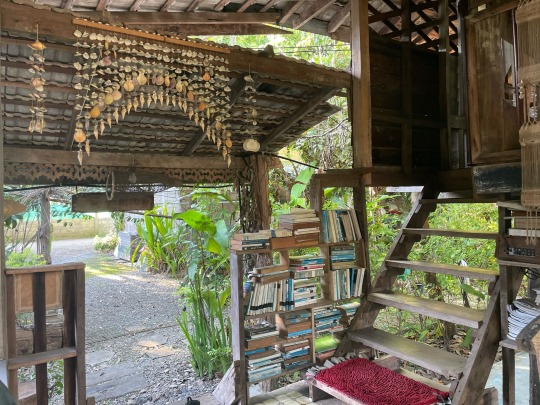
Die Terrasse von meinem kleinen Paradies außerhalb der Stadt.
#backpack#reisen#travel by bus#thailand#travel solo#travel secrets#temple#femaletravel#chiang mai#koh lanta#sonnenuntergang
7 notes
·
View notes
Text
Frislandic Phonology Addendum: Minimal Pairs -Consonants
Just providing these as the first part of a two-part series accompanying the post on phonology. This is going to be a long one (because establishing minimal pairs is always laborious) so feel free to ignore if you aren't really into this kind of thing. Note I'm not giving minimal pairs for every single possible pair of consonants in the language, only ones that are phonetically similar and thus could reasonably exist in complementary distribution to each other, because in many cases that would restate contrasts that can be derived transitively from the examples given (for example since buol 'acorn' contrasts with muol 'hole' and guol 'kidney', we do not need to also state that guol contrasts with muol to establish a minimal pair between /k/ and /m/).
/p/ vs. /t/
bekk /peʰk/ 'stream, beck' vs. dekk /teʰk/ 'skin'
kob /kʰup/ 'flank' vs. kod /kʰut/ 'fox'
/p/ vs. /t͡s/
buoð /puə̯ð/ 'tie together' vs. zuoð /t͡suə̯ð/ 'body, corpse'
bivl /piu̯l/ 'bible' vs. zivl /t͡siu̯l/ 'devil, satan'
baj /pɑi̯/ 'refuse' vs. zaj /t͡sɑi̯/ 'chew'
/p/ vs/ /k/
buol /puə̯l/ 'acorn' vs. guol /guə̯l/ 'kidney'
bijð /pəi̯ð/ 'to a hero' vs. gijð /kəi̯ð/ 'beech'
nab /nɑp/ 'go, leave' vs. nag /nɑk/ 'people'
/t/ vs. /t͡s/
duj /tøy̯/ 'see, look' vs. zuj /t͡søy̯/ 'thirst'
kond /kʰunt/ 'punt (boat)' vs. konz /kʰunt͡s/ 'pike (fish)'
/t/ vs. /k/
dejn /tei̯n/ 'spine' vs. gejn /kei̯n/ 'towards
doroð /turuð/ 'on cloth' vs. goroð /kuruð/ 'cave'
bast /pɑst/ 'cloak' vs. bask /pɑsk/ 'lip'
/t͡s/ vs. /k/
zuoð /t͡suə̯ð/ 'body, corpse' vs. guoð /kuə̯ð/ 'turf'
zin /t͡sin/ 'catch' vs. gin /kin/ 'frame'
zisjt /t͡siɕt/ 'chins' vs. gisjt /kiɕt/ 'be replied to'
/p/ vs. /pʰ/
bier /piə̯r/ 'beaver' vs. pier /pʰie̯r/ 'pier'
sjib /ɕip/ 'dust, fuzz' vs. sjip /ɕipʰ/ 'ship'
bis /pis/ 'ice' vs. pis /pʰis/ 'peas'
/t/ vs. /tʰ/
duoj /tu̯əi̯/ 'elder' vs. tuoj /tʰu̯əi̯/ 'eggs'
dav /tau̯/ 'mind' vs. tav /tʰau̯/ 'surname'
mad /mɑt/ 'shock' vs. mat /mɑth/ 'dream'
/k/ vs. /kʰ/
guol /kuə̯l/ 'kidney' vs. kuol /kʰuə̯l/ 'wall'
Gal /kɑl/ 'God' vs. kal /kʰɑl/ 'peel'
gez /ket͡s/ 'turn' vs. kez /kʰet͡s/ 'hazel'
/p/ vs. /ʰp/
kob /kʰup/ 'flank' vs. kopp /kʰuʰp/ 'cup'
/t/ vs. /ʰt/
zid /t͡sit/ 'moorland' vs. zitt /t͡siʰt/ 'chin'
/k/ vs. /ʰk/
bog /puk/ 'law' vs. bokk /puʰk/ 'oven'
mag /mɑk/ 'sting' vs. makk /mɑʰk/ 'house'
nug /nyk/ 'oppose' vs. nukk /nyʰk/ 'hay'
/tʰ/ vs. /kʰ/
tuol /tʰuə̯l/ 'older sibling' vs. kuol /kʰuə̯l/ 'wall'
tav /tʰau̯/ 'surname' vs. kav /kʰau̯/ 'pain'
mat /mɑtʰ/ 'dream' vs. mak /mɑkʰ/ 'sand'
/tʰ/ vs. /ʰt/
gat /kɑtʰ/ 'street' vs. gatt /kɑʰt/ 'maiden'
bwt /pəu̯tʰ/ 'shop' vs. bwtt /pəu̯ʰt/ 'bellies'
/kʰ/ vs. /ʰk/
mak /mɑkʰ/ 'sand' vs. makk /maʰk/ 'house'
/ʰt/ vs. /ʰk/
datt /tɑʰt/ 'father' vs. dakk /tɑʰk/ 'penis'
mott /muʰt/ 'mice' vs. mokk /muhk/ 'pig'
itt /iʰt/ 'field' vs. ikk /iʰk/ 'lose'
/t/ vs. /s/
doroð /ˈturuð/ 'on cloth' vs. soroð /ˈsuruð/ 'spear'
duon /tuə̯n/ 'floor' vs. suon /suə̯n/ 'snow'
/t/ vs. /ɕ/
tuojn /tʰu̯əi̯n/ 'egg' vs. sjuojn /ɕu̯əi̯n/ 'urine'
/t/ vs. /ɬ/
dang /tɑŋ/ 'gull' vs. llang /ɬɑŋ/ 'speak'
don /tun/ 'apply' vs. llon /ɬun/ 'axe'
duok /tuə̯kʰ/ 'celebrate' vs. lluok /ɬuə̯kʰ/ 'choose'
/tʰ/ vs. /s/
tez /tʰet͡s/ 'brick, block, piece' vs. sez /set͡s/ 'green wood'
mat /mɑtʰ/ 'dream' vs. mas /mɑs/ 'anus'
tiel /tʰiə̯l/ 'day' vs. siel /siə̯l/ 'slug'
/ʰt/ vs. /s/
mott /muʰt/ 'mice' vs. mos /mus/ 'left hand'
datt /tɑʰt/ 'father' vs. das /tɑs/ 'serve'
utt /yʰt/ 'take' vs. us /ys/ 'flies'
/ʰt/ vs. /ɬ/
mott /muʰt/ 'mice' vs. moll /muɬ/ 'beetle'
bitt /piʰt/ 'wren' vs. bill /piɬ/ 'worm'
/ʰt/ vs. /ɕ/
nætt /næʰt/ 'meat' vs. næsj /næɕ/ 'split'
/t͡s/ vs. /s/
ziv /t͡siu̯/ 'stench' vs. siv /siu̯/ 'suns'
zaj /t͡sɑi̯/ 'chew' vs. saj /sɑi̯/ 'brow'
biz /pit͡s/ 'know, understand' vs. bis /pis/ 'ice, frost'
/t͡s/ vs. /ɕ/
zir /t͡sir/ 'wind' vs. sjir /ɕir/ 'faeces'
gez /ket͡s/ 'turn' vs. gesj /keɕ/ 'itch'
/k/ vs. /s/
nog /nuk/ 'blood' vs. nos /nus/ 'cover'
/k/ vs. /ɕ/
guor /kuə̯r/ 'we/you take' vs. sjuor /ɕuə̯r/ 'play'
/k/ vs. /ɬ/
guor /kuə̯r/ 'we/you take' vs. lluor /ɬuə̯r/ 'we/you open'
/kʰ/ vs. /s/
kwð /kʰəu̯ð/ 'oats' vs. swð /səu̯ð/ 'exude'
kad /kʰɑt/ 'beak' vs. sad /sɑt/ 'fight'
/kʰ/ vs. /ɕ/
kav /kʰau̯/ 'pain' vs. sjav /ɕɑu̯/ 'stone'
kwð /kʰəu̯ð/ 'oats' vs. sjwð /ɕəu̯ð/ 'count'
/kʰ/ vs. /ɬ/
kuo /kʰuə̯/ 'bog' vs. lluo /ɬuə̯/ 'open'
/s/ vs. /ɕ/
sara /sɑrɑ/ 'lizard' vs. sjara /ɕɑrɑ/ 'picture, image'
bæs /pæs/ 'porpoise, dolphin' vs. bæsj /pæɕ/ 'valley
bis /pis/ 'ice' vs. bisj /piɕ/ 'whistle'
/s/ vs. /ɬ/
sa /sɑ/ 'do' vs. lla /ɬɑ/ 'cloud'
dos /tus/ 'shoulder' vs. doll /tuɬ/ 'sparks'
/p/ vs. /β/~/u̯/
gab /kɑp/ 'bite' vs. gav /kau̯/ 'crows'
kæb /kʰæp/ 'hear, listen' vs. kæv /kʰæu̯/ 'save, preserve'
/t/ vs. /ð/
kad /kʰɑt/ 'beak' vs. kað /kʰɑð/ 'green, blue'
/tʰ/ vs. /ð/
gorot /kurutʰ/ 'prayer' vs. goroð /kuruð/ 'cave'
uot /uə̯tʰ/ 'vote' vs. uoð /uə̯ð/ 'in a tree'
/t͡s/ vs. /j/~/i̯/
tez /tʰet͡s/ 'brick' vs. tej /tʰei̯/ 'of tea'
bez /pet͡s/ 'spirit' vs. bej /pei̯/ 'other'
/s/ vs. /j/~/i̯/
mas /mɑs/ 'sit' vs. maj /mɑi̯/ 'dig'
uos /uə̯s/ 'food' vs. uoj /u̯əi̯/ 'of a tree'
/s/ vs. /r/
mas /mɑs/ 'sit' vs. mar /mɑr/ 'eyes'
dus /tys/ 'berries' vs. dur /tyr/ 'decorate'
/ɕ/ vs. /j/~/i̯/
mesj /meɕ/ 'fool' vs. mej /mei̯/ 'colour'
gæsj /kæɕ/ 'intestine' vs. gæj /kæi̯/ 'hare'
/ɬ/ vs. /l/
nall /nɑɬ/ 'hat, cap' vs. nal /nɑl/ 'volunteer'
bollu /ˈpuɬy/ 'nephew' vs. bolu /ˈpuly/ 'foreigners'
ijll /əi̯ɬ/ 'grasses' vs. ijl /əi̯l/ 'ash'
/β/~/u̯/ vs. /ð/
mav /mɑu̯/ 'beloved' vs. mað /mɑð/ 'stir'
/β/~/u̯/ vs. /j/~/i̯/
mav /mɑu̯/ 'beloved' vs. maj /mɑi̯/ 'dig'
/ð/ vs. /j/~/i̯/
mað /mɑð/ 'stir' vs. maj /mɑi̯/ 'dig'
zað /t͡sɑð/ 'good' vs. zaj /t͡sɑi̯/ 'chew'
/p/ vs. /m/
buol /puə̯l/ 'acorn' vs. muol /muə̯l/ 'hole, gap'
tob /tʰup/ 'push' vs. tom /tʰum/ 'stand'
/t/ vs. /n/
dus /tys/ 'berries' vs. nus /nys/ 'newt'
desj /teɕ/ 'half' vs. nesj /neɕ/ 'island'
zid /t͡sit/ 'moorland' vs. zin /t͡sin/ 'catch'
/k/ vs. /ŋ/
nag /nɑk/ 'people' vs. nang /nɑŋ/ 'hawk'
tag /tʰɑk/ 'lie across' vs. tang /tʰɑn/ 'gull'
/β/~/u̯/ vs. /m/
mav /mɑu̯/ 'beloved' vs. mam /mɑm/ 'mother'
/ð/ vs. /n/
doroð /ˈturuð/ 'on cloth' vs. doron /ˈturun/ 'a piece of cloth'
guoð /kuə̯ð/ 'turf' vs. guon /kuə̯n/ 'goose'
/j/~/i̯/ vs. /n/
mej /mei̯/ 'colour' vs. men /men/ 'smoke'
/m/ vs. /n/
muoð /muə̯ð/ 'sleep' vs. nuoð /nuə̯ð/ 'sorrow'
mað /mɑð/ 'stir' vs. nað /nɑð/ 'custom'
mier /miə̯r/ 'throat' vs. nier /niə̯r/ 'moon'
/m/ vs. /ŋ/
tæm /tʰæm/ 'sea' vs. tæng /tʰæŋ/ 'deer'
/n/ vs. /ŋ/
an /ɑn/ 'so!' vs. ang /ɑŋ/ 'thing'
buon /puə̯n/ 'drums' vs. buong /puə̯ŋ/ 'float'
/β/~/u̯/ vs. /l/
kæl /kʰæl/ 'lie' vs. kæv /kʰæu̯/ 'save'
/ð/ vs. /l/
kieð /kʰiə̯ð/ 'den, snug' vs. kiel /kʰiə̯l/ 'flash flood'
duoð /tuə̯ð/ 'in milk' vs. duol /duə̯l/ 'thanks'
/ð/ vs. /r/
ijð /əi̯ð/ 'exist' vs. ijr /əi̯r/ 'seaweed'
mað /mɑð/ 'stir' vs. mar /mɑr/ 'eyes'
nuoð /nuə̯ð/ 'sorrow' vs. nuor /nuə̯r/ 'rake'
/j/~/i̯/ vs. /l/
tæj /tʰæi̯/ 'dog' vs. tæl /tʰæl/ 'drop'
duoj /tu̯əi̯/ 'elder' vs. duol /tuə̯l/ 'thanks'
/j/~/i̯/ vs. /r/
mað /mɑð/ 'stir' vs. mar /mɑr/ 'eyes'
/n/ vs. /l/
uon /uə̯n/ 'sound' vs. uol /uə̯l/ 'beer'
duon /duə̯/ 'floor' vs. duol /duə̯l/ 'thanks'
/n/ vs. /r/
kovn /kʰou̯n/ 'cushion' vs. kovr /kʰou̯r/ 'help, assistance'
uon /uə̯n/ 'sound' vs. uor /uə̯r/ 'hours'
/l/ vs. /r/
ijl /əi̯l/ 'ash' vs. ijr /əi̯r/ 'seaweed'
kuol /kʰuə̯l/ 'wall vs. kuor /kʰuə̯r/ 'back of the head'
gald /kɑlt/ 'battle' vs. gard /kɑrt/ 'pack'
/p/ vs. /mp/
kab /kʰɑp/ 'chuckle' vs. kamb /kʰɑmp/ 'night'
gob /kup/ 'clog' vs. gomb /kump/ 'hammer in'
/t/ vs. /nt/
kod /kʰut/ 'fox' vs. kond /kʰunt/ 'punt'
/m/ vs. /mp/
gom /kum/ 'rot' vs. gomb /kump/ 'hammer in'
nom /num/ 'rub' vs. nomb /nump/ 'in front of'
/n/ vs. /nt/
bon /pun/ 'drum' vs. bond /punt/ 'eel'
son /sun/ 'pay' vs. sond /sunt/ 'nut'
I'm likely to add to this list as the vocabulary grows so be aware of that if you decide to reblog.
2 notes
·
View notes
Text
Snow White Winter: "Märchenperlen – Schneewittchen und der Zauber der Zwerge" ("Snow White and the Magic of the Dwarfs") (2019 German TV film)
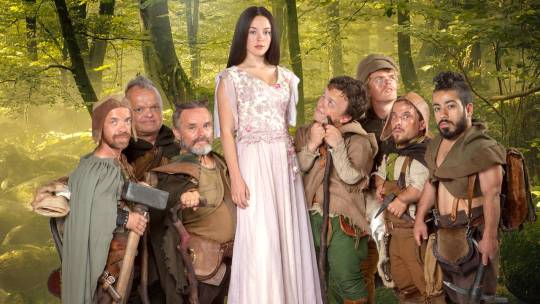
The German series Märchenperlen ("Fairy Tale Pearls") is very similar to the series Sechs auf einen Streich, whose 2009 Snow White I already overviewed. Both are series of fairy tale adaptations that air every Christmas season, although Märchenperlen airs only one or two installments per year instead of four or six. Schneewittchen und der Zauber der Zwerge ("Snow White and the Magic of the Dwarfs") was the 2019 installment of the series.
In a brief prologue, we find the first hint that this will be a slightly modernized version of the tale: the explanation the narrator gives for Snow White's name is her "heart as pure as snow," not the whiteness of her skin. As we meet her, we see yet another "modern" quality: this is possibly the first adaptation with a genuine tomboy Snow White. Not a delicate feminine girl who later learns to be a warrior, a la Mirror, Mirror or Snow White and the Huntsman, but a spunky, athletic kindred spirit to the heroine of the Czech/German classic Three Wishes for Cinderella. Her father having died long ago, the princess is ignored by her stepmother the Queen, who spends each day giving lavish parties and flirting... which gives Snow White ample time to dress in boys' clothes and sneak away from the castle to mingle with peasants and work in a blacksmith's shop. There she first meets the visiting Prince Kilian, neither realizing the other's royal identity until they meet again in the castle. But the Queen is quick to oppose their budding romance, trying to force Snow White to marry a middle aged count while setting her own sights on the handsome young Kilian. At a party, however, Kilian leads a toast to Snow White as "the fairest." Incensed, the Queen has him chained up in the dungeon, and when her magic mirror (which floats in midair with a golden shimmer and speaks through her own reflection) confirms her worst fear about Snow White's beauty, she orders her killed.
The man tasked with the deed isn't a huntsman, however, but the Queen's brother, Gilig. (This is the fourth adaptation to give her a brother who serves as her henchman, either in place of or in addition to the Huntsman – Happily Ever After: Fairy Tales for Every Child, Snow White: A Tale of Terror, and Snow White and the Huntsman all do this too.) He doesn't willingly let Snow White go, but as she runs from him, she slips and falls from a cliff into a river, and Gilig leaves her for dead. But of course she survives, and is saved from drowning by seven especially rugged, gruff dwarfs. They try to leave her behind straight away, but the determined girl follows them through the woods to the mountain cave they call home.
These dwarfs, played by actors with dwarfism, all have names from Norse mythology, several of which were used by Tolkien too: Bömburr, FIli, Ori, Jari, Gloin, Ginarr and Thekk. They aren't miners, but instead collect the magical Breath of Nature from rocks, water and plants, capturing the glowing, wispy substance in glass vials and using it to create various magical things. It was they who made the Queen's mirror, and their latest creation at her command is a golden wig that will give her eternal, irresistibly enthralling beauty. At first only Thekk, the youngest and kindest dwarf, befriends Snow White, while the other six shun her because they distrust humans. But soon she earns their respect by talking down a giant who bullies them and making a friend of him. She still clashes with the eldest dwarf Bömburr, however, as he resigns himself to supplying the Queen with magic, while Snow White wants to fight against her.
Back at the castle, Prince Kilian escapes from prison and overhears the Queen's plot to kill Snow White. The suffocating bodice and poisoned comb are omitted, leaving only the poisoned apple, which Gilig creates but the Queen delivers in disguise as an old woman. Prince Kilian arrives at the cave only to join the dwarfs in discovering Snow White's lifeless body, and in grief they lay her on a bier decked with greenery. But when Kilian kisses her lips, the power of his love summons forth a magnificent glowing swirl of the Breath of Nature, and the Breath revives Snow White.
Our heroes now infiltrate the Queen's castle, Snow White swinging into the throne room on a rope to snatch the magic wig from the Queen's head. Through the truth-telling magic of the mirror, they expose the Queen's crimes, driving the court to depose her. Thus Snow White is crowned queen with Prince Kilian at her side. As for her stepmother, she receives a comical post-credits punishment: throughout the story, we've glimpsed a massive Mt. Rushmore-like monument with the Queen's face carved into a mountainside, but now she and Gilig are forced to do the hard labor of chiseling it away.
The liberties this Snow White takes with the original tale obviously won't suit all tastes. Nor will the sometimes melodramatic cinematography, or the modern look of certain characters' hair and makeup, or the occasional use of pop music in the score, particularly the main theme song, "Komm zurück" ("Come back"), played as Prince Kilian kisses Snow White back to life. But for the most part, I enjoy this version very much. It's a fresh, creative spin on the story with a good blend of drama, warmth, and understated humor, and engaging versions of the characters. Tijan Marei's plucky, playful Snow White, Nadeshda Brennicke's sultry, vicious Queen, Ludwig Simon's warm, ruggedly charming Prince Kilian, and the seven dwarfs are all excellently cast, while the costumes and settings – castle, woods and mountains – are full of atmospheric beauty.
Of the German Snow Whites I've seen, this is one of the best by far.
@ariel-seagull-wings, @superkingofpriderock
#snow white#fairy tale#snow white winter#schneewittchen#schneewittchen und der zauber der zwerge#snow white and the magic of the dwarfs#2019#märchenperlen#germany#television#live action#series#episode
47 notes
·
View notes
Text
I made this post for myself for reference, so it’s really just things about the saints that I think would be handy for writing inej & it’s a wreck bc my note taking hasn’t improved since high school, but anyone who doesn’t want to buy/read the lives of saints, here’s some tidbits?????
Every year, lanterns are lit along the canal and prayers are said to Margaretha, the patron saint of thieves and lost children - ketterdam
A servant had observed the whole endeavor, and word soon spread of the healing properties of Anastasia’s blood. Sankta Anastasia is known as the patron saint of the sick and is celebrated every year with tiny dishes of red wine. - tsemna
Every year on his Saint’s day, the people honor Juris by placing bunches of red amaranth over their doorways and welcoming soldiers and veterans into their houses.
But all the time the sorcerer had been talking, he had not bothered to understand just what Vasilka had been weaving—a grand pair of wings. All he could do was stare as she slipped them onto her arms and leapt from the tower. She soared away on golden feathers that caught the light in their glowing threads and seemed to set the last scraps of afternoon sun ablaze. She is said to have become the first firebird and is the patron saint of unwed women.
Nikolai is known as the patron saint of sailors and lost causes, and it is traditional to set a place for him at the table on the darkest night of the year.
So the general gave the order, as generals do, and Lizabeta’s body was torn apart, and the bees hummed lazily in their hives. It’s said her blood watered the roses of the field and turned the blossoms red. It’s said the blooms planted on her grave never perished and smelled sweet the whole year round, even when the winter snows came. But the bees have long since left those hives and want no business with those flowers.If you can find that meadow, you may stand and breathe in the perfume of its blossoms, speak your prayers, and let the wind carry them west to the sea.The roses remember, even if wise men choose to forget. Lizabeta is known as the patron saint of gardeners.
Sankta Maradi is known as the patron saint of impossible love.
at the base of the Sikurzoi, the Suli have always been able to find shelter in the caves that Marya left behind. She is known as the patron saint of those who are far from home.
Vladimir’s body drifted to shore on the tide, and the people of Os Kervo gathered him up and placed him upon a bier covered in lilies. For another thirty days and thirty nights, they came to pay their respects, and to the astonishment of all, Vladimir’s corpse did not rot. On the thirty-first day, his body dissolved into sea-foam, leaving behind nothing but a small heap of sea salt among the lilies.He is known as the patron saint of the drowned and of unlikely achievement.
It is customary for the mothers of brides to offer prayers to Sankt Valentin, and seeing a snake on your wedding day is known to be good luck.
Petyr would not let go. He died that day, but so did the demon. Sankt Petyr is known as the patron saint of archers.
Yeryin is the patron saint of hospitality.
Feliks told them there was no magic, only nature. He refused to confess to any crime and only asked to be turned on the spit so as to cook more evenly. His bones were scattered over the ground, and without his care, the orchards froze and faltered. Ever after, the only tree that would grow in that soil was the thorn wood, its branches thick with fruit that never ripened. The people of the Tula Valley starved along with everyone else and had their equal share of misery. Sankt Feliks is celebrated in the spring with feasts of quince and apple and is known as the patron saint of horticulture.
Lukin’s head was placed upon a golden platter, and from it, he dispensed advice to the new king for the entirety of his rule, which was long, just, and miserable. Sankt Lukin is the patron saint of politicians.
The village continued to starve no matter how many girls they put to death. But the girls who prayed to Magda would often find themselves swept up and carried into the heart of the forest, and so she is known as the patron saint of abandoned women, as well as bakers.
The palace Egmond built was unlike any seen before it. A stone serpent guarded its high towers, its bridge of glass and moat of floating frost, its silver clock tower, and the sacred ash at its heart. Ever since, the Ice Court has stood, its walls unbreached by any army. Sankt Egmond is the patron saint of architects.
The child Ilya had dragged back from the next world wandered the village, asking for his mother and father, begging for a place to sleep. Every door was closed to him, and so he was left to the woods, where he can still be heard crying. Sankt Ilya is the patron saint of unlikely cures.
A chapel was built into the rock on her island, where sailors’ wives still come to pray to Ursula, patron saint of those lost at sea. They leave offerings of bread baked into the shape of fish, and wish for their lovers’ swift return. When they leave, some find bones or sea pearls in their pockets, though no one is sure if these are ill or good omens.(fjyerden)
The good people of the village set the hem of the wolfhunter’s fine velvet coat alight and chased Dag Ivar down the road and out of town. Mattheus continued to visit with the pups until they were grown wolves themselves. They came when he called, lay at his feet, thumped their tails when he told them stories. Their pups were tame in the very same way, and took to guarding the doorways and hearths of the village their grandmother had once terrorized.These were the first dogs, and this is why Sankt Mattheus is the patron saint of those who love and care for animals. (fjyerden)
Dimitri was the son of a king but wished he had been born otherwise. From his early days, he wanted only to contemplate the works of the Saints and study scripture rather than statecraft. When the time came for him to assume his responsibilities as a future ruler and to find a bride, he begged his parents’ pardon and informed them that he had no intention of marrying or of ever assuming the throne. He would give his life over to piety and prayer. At their wits’ end, the king and queen ordered their only son locked in a tower, vowing that he would be denied food until he agreed to wed and become the prince he was meant to be. At last the queen demanded that the tower be opened so that she could see her son. When the guards broke through the door, they found a skeleton sitting at Dimitri’s desk. It cheerfully waved to the queen and invited her to pray with him. The queen ran screaming from the tower, and the king and all their servants followed. Sankt Dimitri, patron saint of scholars, may be praying there still.
Gerasim is known as the patron saint of artists.
#STUDY — & i’m still a believer but i don’t know why *☾#reference.#like these notes are so messy it's funny#the little headcanons I've put together about how inej celebrates their saint days tho
7 notes
·
View notes
Text
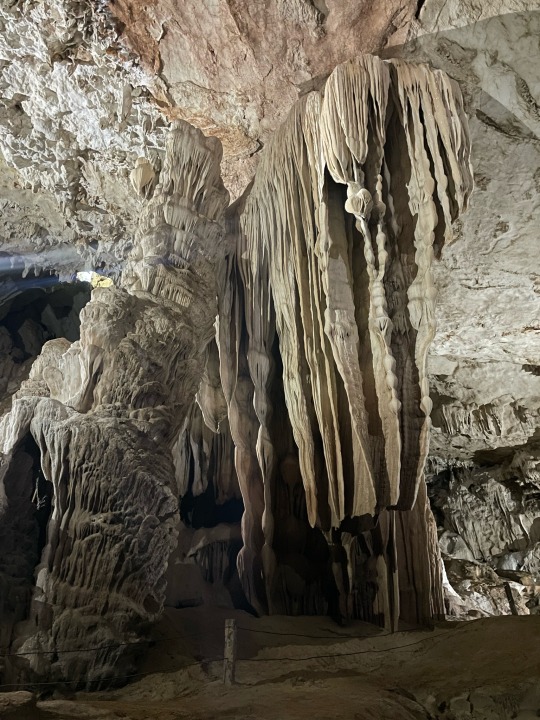
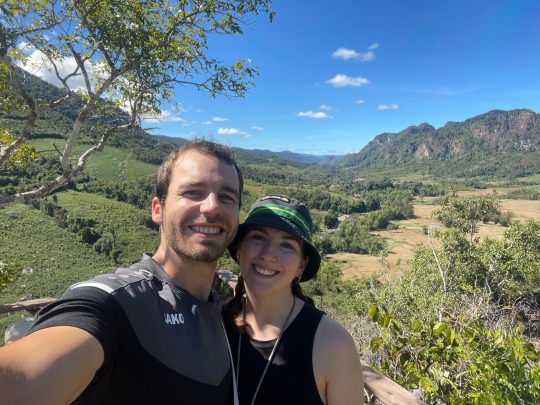
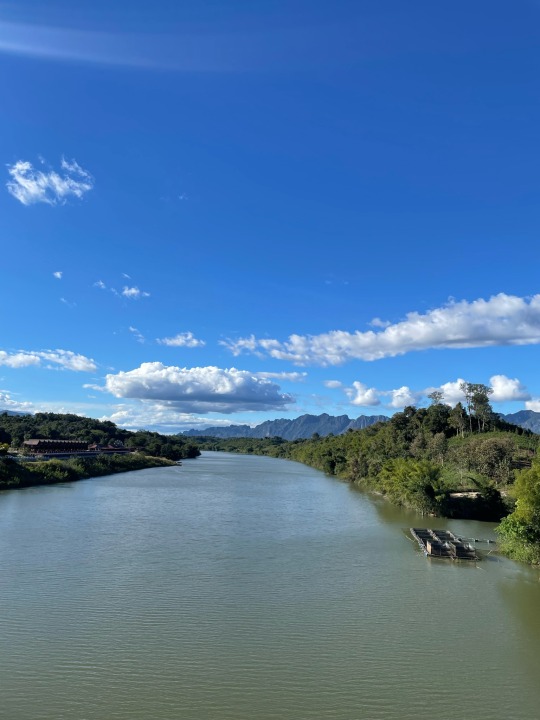
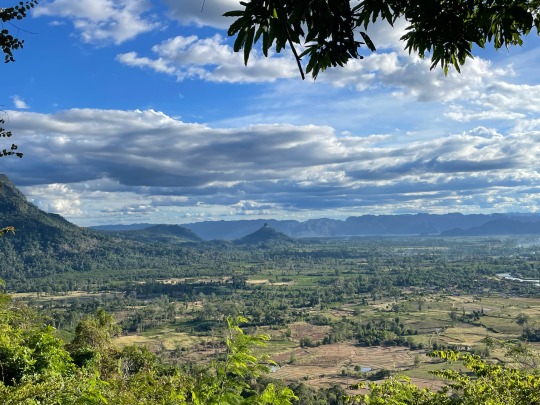
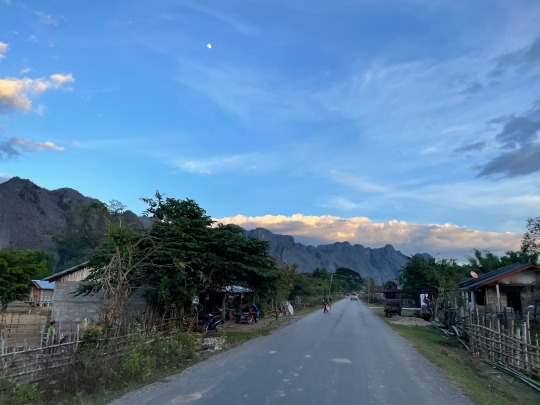
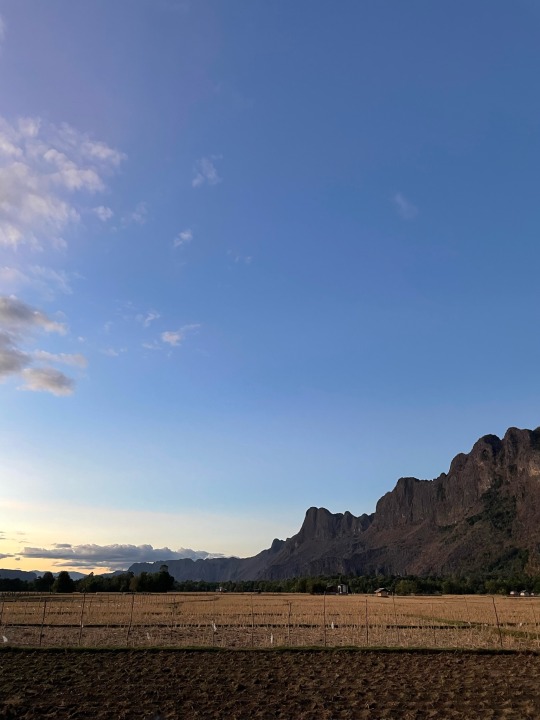
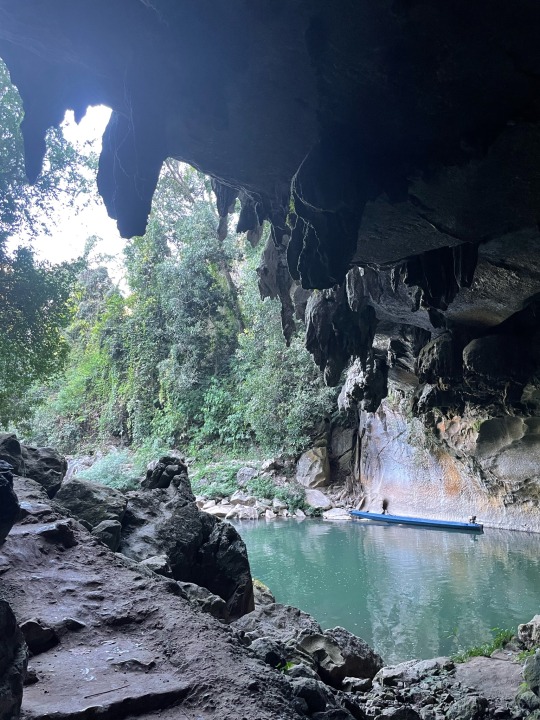

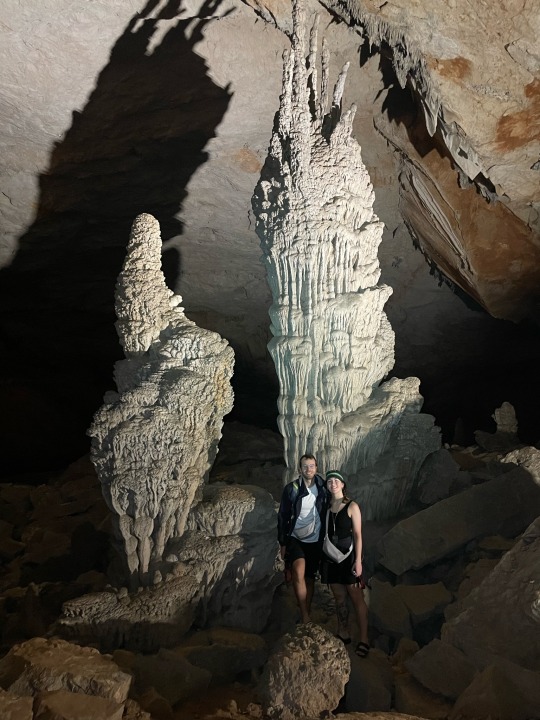
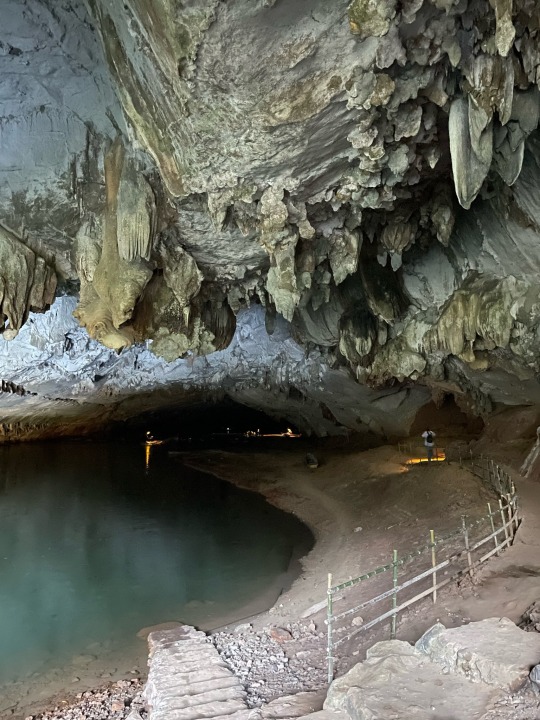
Auf dem Weg von unserem ersten Guesthouse nach Konglor haben wir mit Kieran und Alice die Dragon Cave besucht, die wir beide echt sehr beeindruckend fanden. Dort gab es auch einen Aussichtspunkt über die schöne Landschaft von Laos. Generell ist der Loop auch für die wunderschöne Landschaft unterwegs bekannt. Überall sind riesige Karstberge mit Dschungel überzogen. Kühe, Ziegen, Hühner und Hunde rennen neben und über die Straße wie es ihnen gefällt. Die Kinder freuen sich wenn Touristen durch die Straßen fahren und winken uns immer zu. Der zweite Stopp an diesem Tag war der Cool Pool in dem wir uns wirklich mal abkühlen konnten. Das Wasser war herrlich kalt und glasklar. Nach zwei weiteren Aussichtspunkten und sehr holprigen Straßen kommen wir in Konglor an. Abends trinken wir wieder ein paar Bier und reden über Gott und die Welt (im wahrsten Sinne). Früh gehts für uns los zur berühmten Konglor Cave - eine 7km lange Höhle die zur Stadt Natane führt. Bei der Ankunft haben wie Victor kennen gelernt, der mit uns gemeinsam die Tour gemacht hat.
3 notes
·
View notes
Text
Hi lovelies,
Today’s entry is about the story of Narcissus, but more specifically Ovid’s version of the myth from his book ‘The Metamorphoses.’ Ovid tells the story of Narcissus from his birth and how he was fathered by a river god to a nymph named Liriope. Liriope was told by the prophet Tiresias that Narcissus would live a long and full life so long as he never recognised himself (i.e he never saw his reflection and lived unaware of his looks). Side note- Ovid and his infinite weirdness tells the story of how Tiresias became a prophet and it’s actually quite interesting if any of you want to read up on that.
“If he fail to recognise himself a long life he may have, beneath the sun.”
At the age of fifteen, Narcissus was fast approaching manhood and a nymph by the name of Echo began to fall in love with him. Echo was named as such because she had been too verbose for the likes of Juno and so she was cursed to not be able to repeat the words of others.
“Your tongue so freely wagged at my expense, shall be of little use;… And, ever since, she only mocks the sounds of others’ voices..”
The next part of the story is near impossible to narrate as well as Ovid so I’ll try and explain it quickly, but it’s probably better you read the excerpt below. Ovid describes how Echo falls madly in love with Narcissus and how she follows him secretly through the woods, becoming more and more obsessed with him the closer she gets.
“Presently the youth, by chance divided from his trusted friends, cries loudly, “Is anyone there?” and Echo, “One there!” Replies. Amazed, he casts his eyes around, and calls with louder voice, “Come here!” “Come here!” She calls the youth who calls.—He turns to see who calls him and, beholding naught exclaims, “Avoid me not!” “Avoid me not!” returns. He tries again, again, and is deceived by this alternate voice, and calls aloud; “This way! We must come together!” Echo cries, “We must come together!” Never sound seemed sweeter to the Nymph, and from the woods she hastens in accordance with her words, and strives to wind her arms around his neck. He flies from her and as he leaves her says, “Hands off! May I die before you enjoy my body!” Naught she answers save, “Enjoy my body!”
Ovid then goes on to narrate how Echo, so scorned, wandered through the woods, hid her face in shame, and from then on lived alone in a cave. Despite his rejection, Echo’s love for Narcissus persisted, but the grief of being rejected ate away at ether until only her bones and the echo of her voice remained. It is said that her bones changed into rocks, not to be seen by anyone, but that her sound still remains.
However, Narcissus continued to wander through the woods after he rejects Echo. After wandering for so long he ended up losing the friend with which he first entered the woods with and whilst running around madly looking for them, he finds a river to quench his thirst with. When he drops to his knees to drink some of the water, he accidentally caught sight of himself in the river. From that moment on, he fell in love with his reflection.
Unable to embrace his own reflection, Narcissus pined madly for himself and could not eat or rest due to his burning desire and love for himself. Echo’s Echo (that was confusing to write) followed him around watching him being consumed by passion for himself, a direct parallel to the way she pined for him. Eventually, Narcissus lay down in the grass and uttered a soft ‘farewell’, which Echo repeated. With that Narcissus died, madly in love with himself.
Finally, not for the first time in the Metamorphoses Ovid paints a vivid picture of the transformation from failed love to death to rebirth as a flower. Ovid writes about Narcissus’ metamorphoses, saying:
“His Naiad sisters mourned, and having clipped their shining tresses laid them on his corpse: and all the Dryads mourned: and Echo made lament anew. And these would have upraised his funeral pyre, and waved the flaming torch, and made his bier; but as they turned their eyes where he had been, alas he was not there! And in his body’s place a sweet flower grew, golden and white, the white around the gold.”
If any of you want to conjure up a more visual image of the story then I would recommend taking a look at Caravaggio’s Narcissus (1594), Ludwig von Huffman’s Narcissus (1900), and John Waterhouse’s Echo and Narcissus (1903).
Ovid’s beautiful storytelling creates such a vibrant and striking image of Narcissus and the heartbreak that Echo endures as a result of her rejection. I hope you all enjoyed reading about it as much as I enjoyed researching it! Hope you all enjoy your weekend.
~Z
#classical studies#classics#dark acamedia#greek mythology#ancient rome#roman mythology#homer's iliad#the iliad#the aeneid#narcissus#ovid daily#ovid's metamorphoses#echo night
6 notes
·
View notes
Text
c7, waking dreams: master of fate
hello everyone. i am not dead. here's chapter 7. rest on a03 here.
Miraak lay upon a bier in the cool depths of the temple, and closed veinless lids over hollow eyes.
His soul rampaged in his chest, howled at the confines of the thick earthen ropes of muscle that bound skin to skeleton, blood to bone, mind to matter. He wailed at the horrible, cruel inevitability of a creature of air and fire, frost and sky, beyond all fragments of soul made form, chained within the lugubrious hell of a mortal body. His soul had not been meant to be a man, and each step he took was shadowed with the terrible loss of what Akatosh had taken from him – his claws and teeth, his strong wings to bear him far away, his lashing tail and his serpent’s eye – all for the sake of fate.
But he was Miraak, mightier than any god’s plan for him, stronger than any restless ghost or dragon, and he mastered his own fate. And so he lay there, his dragon-borne heart pounding a war rhythm in his chest, and he ate Krosulhah’s soul.
In dreams, he was Krosulhah, and he was magnificent. He knew it, he breathed it, he lived it. He was the lord of secret sorcery, the subtle manipulation of the mind, and the harsh glaze of sun on autumn ice – deceiving in its solidity to the eye, treacherous beneath. Flight was a dream to him, he knew nothing of cages, the earth no more a prison than his immortal body understood the concept of nightmare.
Scents of warm-home-heart tickled his nose as he lazily chased a thermal in a rising arc. The kind gusts belled out his regal blue-white wings, until he stretched each wingtip and felt them cup each halfway around the world. Far below, the rugged tip of the new land of fahliil basked in the spring sun.
Fresh with melted ice, the Sotkol joore-nest was so dark and brazen against the fading snowheights of the strunmah Krosulhah had chosen that the rounded roof seemed smeared with ash, as if a firebellied Dov had saw fit to free its followers from another winter. Bossy Kruziikrel, come to flaunt its ruby foe-teeth, and boil Krosulhah’s cold waters with its fiery scales until the soothing seas itched too terribly to lie in, would do that if only to steal Krosulhah’s favourites away. But no rival had seen fit to poach from Krosulhah’s flock.
No, today was a good day, wrought in spring-sun warmth that scattered droplets of icewater along Krosulhah’s shimmering silver spine. His garlands of frost were melting, under the heat of this southern sun, and as his next lazy downbeat sprayed cold rain across the stubborn crags of the mountain, he marvelled.
To the bitter north, there was no season of spring, or of summer, ground away by the passage of time. Krosulhah, born from the heaving seas of the world’s birth, remembered the creation of all seasons, how winter shook itself in first snapping and snarling, and out of its corpse grew fresh shoots, game that was fun to chase, and the joore.
Futile, summer-bright things, with soft teeth and softer paws. Such quiet voices they had, that they needed whole packs to sing with the resonance of dragons. Friendly, fearful creatures, living like termites in the dense warrens of cave and tree, their small eyes glittering in their flat faces like tiny gemstones. They did not glow, like a dragon’s eyes did. Instead, a joor reflected the light that was around it, one of the qualities that had made them so perfect for their great purpose.
Atmora’s endless winter was no trouble for ice dragons who loved the snow, but – Krosulhah tucked his wings and fell like a spear hurled from the heavens towards the sea, and the waiting chasms of gnashing rocky teeth beneath the waves, guarding the labyrinthine seacaves snarling through the rugged map of this part of Keizaal – it was not dragons alone who loved the Dov.
Dukaan was waiting for him when he breached the black water, seafoam gilding the pure icicles that clung to his argent jaw, the mighty forking of his submarine frill crowned by an impressive thicket of ice and emblazoned with chill that made him glitter as if he were crusted with precious gems. The glow of his own eyes scattered moontossed beams around the smooth walls of the seacave, catching in the rigid lines of swirling decorations carved with clever joor paws until it seemed as if the whole rock wall was alight, alive, with the ripple of waves. Only joore could turn rock to water, with nothing but shadows and the light of a dragon’s eyes.
His breath curled out ahead of him in a foggy plume of white. Dukaan’s scalloped silvery mask, so like Krosulhah’s own scales, paled with ice crystals that hung heavy in the mantle of white fur around her shoulders. Beneath it, her eyes glistened, bird-black as onyx.
“Beautiful one,” she said, spoke smooth and true, like any good joore raised to the dragon tongue did, “I am awed and ashamed to kneel before you, in such humbleness as I do.”
Krosulhah lashed his great tail, driving his spiny body further up into the sea caves beneath Sotkol and emerging from the chill water. He fanned his wings, billowing gusts of cool air up the passageways cut large enough for even a dragon to pass through and ruffling Dukaan’s robes. She had left him just the perfect amount of space to settle on his ebony sharp claws and diamond-plated chest, just close enough that he could arch his spiny neck to press his scaly snout to her chest without having to wriggle forward at all.
How well she knew him, from tip to tail, from scale to soul.
Her small arms came around his jaw, deft claws painted silver as his reflexively seeking the soft patch of scales under Krosulhah’s throat for a good scratch. The tips of Krosulhah’s wings sagged as he melted under her attentions, careful to angle the sharp prod of his tusks away from her delicate flesh. Her robes rumpled and fluttered as if caught by stormsung winds when he exhaled a greeting breath.
She blew back, more of a chin jerk of her flat face than any breath, captured as it was in her mask. Her eyes gentled at him, all that unbearable softness on display; how careful a Dov had to be, to avoid hurting them with their fragile skins and their bodies full of a thousand pulsing things, without a single one of which they withered away into a sleep that they could not be woken from again. Precious, momentary things, as warm and lovely as the sunlight’s dazzle on bright wings, between the onward march of the clouds. And so he greeted her with breath and air, and not with fire.
“Drem-lok,” Krosulhah rumbled with pleasure, “di-sonaak, Dukaan.”
“Hail, Krosulhah,” she returned, and tipped forward until her slight weight rested against his nose, negligible to dragon as large and strong as Krosulhah. Her warmth cradled the sensitive, flexible scales of his head, too hot to be borne, if it were not for her. She sighed. “What news from the north? Has Al-Du-In caught wind of our plans?”
“Niid,” Krosulhah said. “I think not. Yet. Faasnu Kruziikrel has been given a new priest. Fah yol mey. After much whining.”
“The fearless one should perhaps stop killing them, and then would not need more,” Dukaan muttered. Her blunt claws scratched under his chin with a surge of vigour; even with strangers, she felt their loss, she felt for their pain. Krosulhah wondered where she put it all, in that small chest with its rabbit-thudding pulse counting out the scant seconds of her life. “No matter how convenient it is for our smuggling operations.”
Krohsulhah snorted a laugh. He thought Dukaan would govern the joore at Kruziikrel’s nest better than Kruziikrel did, and this was a fine joke, to imagine her giving mighty, flaming Kruziikrel, impatient with everyone, orders that must be obeyed, weak as a kitten. How could a joor control a dragon? They were such small creatures, barely any teeth at all. But they spoke a dragon’s tongue, and their hearts were steadfast and strong, stronger even, Krosulhah thought, than the Dov. But without a dragon’s Voice, their will was still dependent on a dragon’s indulgence to listen.
“You speak with the mind of a joor, but a Dov’s sense, dii. I do not think this one will last long.”
“What mask does he bear?” Dukaan asked. She rose, and after a quick, guilty look behind her, pulled off her own mask to press a quick kiss to Krosulhah’s horn. Her fur spilled out her face around without the voluminous hood to keep it back; always so much more than Krosulhah expected there to be. He swore it grew every time he looked away. Such was the nature of mortals, constantly changing.
Obligingly, he bent his neck to allow her to climb up his spiny shoulders, and find a perch there with her clever hands wrapped around a spare spine. Nimble and quick, these joore, and how quietly they could move without the earth lumbering through each of their heavy steps! Dukaan’s small claws tickled when they skated along the ridges of his polished scales. Some joore did not even have that much, and were small and weak all over, full of warm blood and soft meat. But not his Dukaan, no. She smelled perpetually of cool snow, and never minded his chilly scales even in the longest arc of winter.
“Faaz, rok los…” Krohsulhah’s mind sought a glimpse of memory as Dukaan scurried about on his back. She was a warm spot on his back, right over the vulnerable place where his neck joined his body. When she had settled herself, a loose rope wrapped around Krosulhah’s neck, she tapped his scales.
The flash of a mask came to him, the strange, oily scent the priest had carried following quick after. Like snorting sparks, it had stung his nose with the briny memory of the madness that lurked in the deeps. Though he had worn many bells in his robes that jangled and clashed together harmoniously, the little joor had been slow on his feet, and his eyes submissively lowered. His will was already broken despite winning for himself a mask of the favoured, and every step drug against the tidal current of the deep, and his rattling breath was the whisper of wind through fallen leaves. Of dead things, of decaying things, of the strange, still sleeps of the joore, wherein they would never wake but only dream.
Kruziikrel would be through with him in barely a year, Krosulhah thought. Firebright Kruziikrel, bragging and gloating, immense and majestic, saddled with this sad little creature, whose very breath seemed to hum a discordant note in a song? No, Krosulhah suspected he would barely live long enough to allow Dukaan to take advantage of the chaos of his arrival to steal away precious joore from the talons of unworthy Dov. On the heels of this recollection, Krosulhah remembered the name.
Pleased with himself, he ruffled his wings. “He is Miraak.”
---
---
The maw of Raven Rock was set low beneath the vast scowl of its walls, the teeth of its portcullis scraping the drifting hills of ash. As Frea and Nikulas crested one such shifting, powdery hill, the bonemould-clad guards slammed their spears down into a jagged ring of spikes. The close eye of the sun hanging like a spectre over the ashy clouds wreathed their bristling spears into individual points of fire. Each fearsome helmet hid sharp red eyes that were as cold and hard as rubies.
“Halt!” one shouted.
Placatingly, Frea raised her hands. The strap that secured Laataazin’s hammer to her shoulder dug into the meat of her muscle and ground against the bone.
Nikulas glanced sidelong at her. He had been carrying his bow in hand, like any good hunter ever watchful for a flushed hare or snowfox. As he fumbled to hastily copy her, he dropped it. The bow hit the ash with a muted thump, the string snapping back against the wood.
He cringed. Frea pursed her lips and kept her eyes forward, Nikulas’ blazing cheeks like summer sun in her peripheral vision.
She offered a silent prayer to the All-Maker that Nikulas had not cracked his bow. The Dunmer bows Frea might find to replace them in town were built for slender elven proportions and were made to be regularly drenched in oils and set alight. Nikulas’ thick human fingers would struggle on the small grips, and it would never shoot as well cold.
But beyond the practicality of conserving the Skaal’s limited resources, there was something in the air here she didn’t trust. Suspicious xenophobia, Frea expected that, but not raised weapons. It had never gone so far as that before.
The clumsy disarmament eased some of the more undisciplined guards, and a few spear tips closer to the back dipped to rest gently on the ash. No doubt they would be hastily taken up if the captain scowling at them from under his bonemould helm turned.
The young were the same everywhere, it seemed.
“Hail,” she called, in her clumsy Dunmeris. She knew only a few words, enough to announce who she was and that she meant no harm. She had never been tasked with hunting or trading with the lowland elves and so had never had occasion to learn more than the basics, though travelling with Laataazin who understood barely more than she and could not speak at all had brushed up her skills.
At her shout, a wave of relief swept through the guards; even the less green ones slumped. At the captain’s gesture, the ring of spears raised, put up against bone-plated shoulders with a deathly rattling.
“Hail, stranger,” he said, “Welcome to Raven Rock.”
The guards formed two neat rows for Nikulas and Frea to pass through. Stepping into the shadow of the Bulwark, Frea swallowed around a lump of apprehension.
Even Nikulas’ vibrating eagerness died into a wary sort of unease that matched her own as they passed under the towering walls of the Bulwark. No seasoned hunter was he, but he didn’t need to be one to feel that Raven Rock had all the tense exhaustion of a trap in waiting.
The huge walls loomed over her, pressing her into the vast dark heaviness of their enfold. The air was noticeably hotter inside, almost clammy with a thick shimmer that clustered round the dun, dully shining carapaces of the houses, bone, shell and chimes of carved wood, unmoving in the listless still. The fields that pressed up against the walls of the Bulwark like the rolling crumples of patchworked furs were fallow soil, dark and picked bare.
Braziers were lit at every corner, burning with sweet perfumes that cloyed the air. The townsfolk haunted the alleys between the dusty gutters, half-choked with ash that was normally swept away. There were more than Frea remembered, rangy and lean as wolves. Sunken into tight, pinched faces, the knots of their bellies, their spirits flickered and glowed like banked coals.
She stumbled into the gaze of one elf counting coins in the shade of a sprawling trama root. Quick as an arrow, the coins vanished in a silver flash, and their slender hands with nails painted poison purple crept into the ash to curl around the hilt of a wicked-looking dagger. Outlined in the dark shadows of tear-tracks, their eyes burned as they lingered on Frea’s weapons.
The attitude was quiet; subdued. No one talked. There was no laughter or song in these streets, only the whispering of the ash and the silent, persistent sense of being watched.
Purposefully, Frea struck out across the town, towards the Earth Stone. The sea breeze chilled her cheeks as she crossed the boardwalk, her boots echoing hollowly. The Earth Stone sat a little away from the nearby buildings, still with half-risen barricades and guard posts that stood empty, like eyesockets dotting the walls of tombs. It was not completely unattended; a single Redoran guard was slumped over a rickety chair, snoring into his helmet.
Careless. Frea bit her tongue and tasted salt flecked on her lips.
Nikulas’ footsteps were silent as a cat’s behind her as Frea skirted the guard and slipped into the barricaded area around the Earth Stone. Dark water sloshed over her boots, and she grimaced. Nikulas nimbly hopped over to the ring of stone that hugged the very plinth of the Stone, risen like grave marker to the smoky sky. Squaring her stance, Frea leant back against the barricades and crooked a rune of mage-sight, the third finger of her left hand against the pad of her thumb, over her eye.
The glistening leylines of the land superimposed themselves over her sight, threads woven round the swollen nexus that was the Earth Stone. The magic here pulsed and roiled like the ocean not too far from its lonely hill, disturbed as a kicked nest. It dragged deep, through hollow chambers of ancient rock, through the very twisting foundations of Solstheim itself. The blood of the All-Maker pounded through the tributaries that had been cut here by Frea’s ancestors long ago, risen into glowing pools of energy clustered around each Stone, invigorating the earth, purifying the waters and sweetening the sky. The whole island sung through these Stones and the Skaal that watched them. To the learned shaman who knew how to read them, the Stones had once whispered of everything from the tiniest forager to the greatest tree, the silent humming of the mountains, the dead men that slept in their cold tombs, the vast network of power that stretched over Solstheim together like links in a great chain.
But now, all they sang was one word. One name.
Miraak.
His touch fell upon her soft as snow kissed her cheeks, but there was no will there. Just – presence. Awareness, like she was being watched, in the same slow way the moons observed the passing of the stars and the interminable dancing of fireflies. Mortal lives, flickers of light against the encroach of void, dark as ink and deep as memory itself.
Uneasily, Frea took a step back, out of the inky water around the base of the Stone, certain that in the dim waters that oozed there she had caught sight of Herma-Mora’s eye.
“This needs cleansing,” she muttered.
Hand straying to his bow, Nikulas peered into the water suspiciously. Frea doubted he could shoot an arrow anywhere helpful, but she understood the desire to face the unknown with a weapon in hand. “Is it this bad at the Wind Stone, too?”
“You can sense it?” Frea eyed him, but he did not seem any different, if a little nervous.
Avoiding her wary squint, Nikulas rubbed the back of his neck. He checked his fingers, as if expecting blood – or maybe ink – to have stained them. “It’s – louder here. I hear him.”
“You hear him?!” Frea grabbed her amulet subconsciously. The flicker of her father’s magic was calming, but it warred with a creeping and persistent guilt. She only had the one, after all, and one had not been enough without Laataazin’s aid. Amulets, weapons, and all the wisdom of the Skaal hadn’t been enough. This time, they had to be, there was nothing else. “… What is he saying?”
Nikulas shifted from foot to foot. He pushed the hood of his fur parka down, revealing a pale face that was glossing with sweat. The brisk, salty wind chapped his cheeks, but it could not hide the tips of his ears turning red. His tongue darted out to wet his lips, anxious as a watersnake caught in a rockpool by stirring seas.
“Just…” Nikulas squeezed the grip of his bow until his knuckles turned white. The stretch-blanched skin over his knuckles stood in harsh contrast to the hectic flush brimming in the hollow of his throat, his wrists, all the places where vulnerable blood gathered. As he stood motionless, his eyes glazed and his pupils narrowed to pinpricks, as if he stood before a great bright light that Frea could not see. He began to sweat, drips sleeting towards his dampening collar. He held his body too rigid to shiver. Like even breathing would be too much.
“I hear his whispers,” he breathed, “… and there’s music – singing – just far away, but I can… I – I feel like flying.”
He scuffed one of the carven lines worked into the base of the circle around the Stone’s base. A tingle worked its way into her aching bones where her skull met her spine. The trapped energy hummed restlessly, visceral as a shudder caught under her skin.
Something… stirred.
Acting quickly, Frea yanked Nikulas’ arm. He toppled half-over, yelping as he splashed foul water up to his knee, but Frea did not pause until she had towed him out of the stone circle, past the barricades and the sleeping guard.
Seizing him by the shoulders, Frea shook him. Anxiously, she searched his face, fever-flushing darkly, the hair on his temples curling with his sweat. His oak-brown eyes were muzzy. He blinked at her, trying for a wobbly smile. Nearly hoarse with relief, Frea released him and whirled around to hide her face. For a moment, she’d thought – well, it didn’t matter what she had thought.
Groaning, he sagged against the barricade wall nauseously, one arm creeping around his stomach. He touched himself like a stranger to his own body, a faint grief or virulent relief pinching his mouth as he ran human hands over his nose, his cheeks, gripped at his belly. “Oh, that does not feel good.”
“We should leave this place,” Frea managed to keep her voice clear, though cool, though fear threatened to strangle it, she could not alarm him, she could not. She could not risk bringing to his eyes, so young and bright with a hope yet to be crushed out, the dreadful fear she had felt those nights at the Stones, shaking numb limbs and feeling around her neck the necklace that warded her like a lodestone for the prayers of her people. “Are you well, Nikulas?”
“Aye.” Nikulas leant over and spat illustratively in the dirt. He plastered on a rather wan, but brave face. “Aye, see, no hammering from me. I’ve got your back, Frea.”
“Alright,” she said. She worked her jaw around the words, feeling them thick and awkward in her mouth. A headache crept into her temples and banged there like incautious shutters. Her stomach did not want to relax from its tense nest of snakes. She wanted, badly, to be away from the Stone. “But tell me if you start to hear anything again.”
“Aye, shaman,” he said lightly, but his eyes were serious.
As he followed her away from the shrine, Frea caught him glancing over his shoulder and rubbing at his ear, as if to remove the phantom feeling of lips against it, did not speak of the wordless surge it roused within her. She kicked a stone against the foot of the guardsman as they passed, already several swinging strides away by the time he spluttered himself awake.
She did not think this place should be unguarded. No more were the Stones watchful guardians and earthen protectors. Not for the Skaal, and not for the people of Raven Rock.
“Those… whispers,” said Nikulas as they left, “That’s what Oslaf and the others heard, wasn’t it?”
“No,” Frea said tightly.
Her boots came down aggressive and sharp on the hollow chitinous planks boarding the ashy dust of the pathways, and she forced herself to slow down. They were attracting odd looks. Skaal weren’t a common enough sight in Raven Rock to go without notice anymore. They hadn’t been since before Miraak’s curse had started stirring in the Stones, and they had rather more on their mind than trading furs for spice and lowlander coin.
The guards were watching them warily, their hands on their belts loosely fingering weapons. The guards had never been the friendliest of Dunmer in Raven Rock, but they had usually treated newcomers with distant politeness. Perhaps Frea owed her chillier reception to the fact she no longer walked at the Dragonborn’s side. The world had seemed colder, greyer, without Laataazin in it, somehow less full. They had this air of gravity and purpose about them that made any chore into a quest, an adventure, a legend.
The heft of their warhammer on her back restored the weight of their company, but not the wonder. Or perhaps that had been Frea’s own brand of foolish youth, when she had still thought that saving the day would be enough to undo the night that had ruled before it.
Frea’s absent mind had taken them unconsciously to the forge district, where she did most of her trading when she was in town. The tradesfolk of Raven Rock were always friendlier than anyone else, welcoming fine Skaal craftsmanship. Here, at least, she was greeted with gruff nods and the occasional thin-lipped smile.
“Am I going to start dreamwalking?” Nikulas asked quietly from behind her, drawing her attention to the uncomfortable silence that had settled between them.
Grateful to be drawn out of her thoughts, Frea smiled at him. It was a thin, drowned thing. Nikulas’ dark eyes furrowed up, unsure how to take good humour from her. She touched his elbow, trying for reassuring instead of staid.
“No, I don’t think so.”
His answering smile came out like the dawn. “Thank you, shaman.”
Frea looked away from his innocent warmth and tried not to think about the fact that as long as Frea held the only amulet resistant to Miraak’s powers, Nikulas could be commanded to work the Stones whenever he liked, and Frea would be none the wiser til she found him, hammering away.
The clang of metal on metal answered her thought, and Frea jumped. She found Laataazin’s hammer all but materialised in her hands, digging into the meat of her palms bruisingly. Her bare fingers looked muddied and cold, childlike, curled around the heavy haft. The Raven Rock smith, a wiry, pale human from far across the sea, glanced up at her. His canny eyes were sunk low in his skull, mounded with exhausted wrinkles.
“Ahoy, Skaal. You want your weapons fixed up, you’ll have to wait. Guards’ order came through first.”
“Oh, we weren’t here to trade…” Nikulas started, but Frea approached the smith, caught by the stick of iron he was scrutinising. Sensing a conversation, the smith, Mallory, shoved it back into the coals.
Closer to the forge, the heat was fearsome, fire-salts popping and crackling in the hearth like chattering atronachs. Flame-treated Dunmeri weapons would not melt in any ordinary fire, at least, not without frost-salts to weaken them first. Frea knew that much, from Baldor Iron-Shaper’s grumbling when the Skaal brought back treated weapons from trade. The Skaal were no witch-elves, they did not conjure atronachs and daedra and slay them for their heartfires and skin-salts. But Frea’s own war-axe had been made with fire-treated quicksilver folded round a steel blade, and it had cut through the searing attacks of enemy Dunmer as if their fires were water.
“That blade has been sheared in half,” Frea interrupted. “… Of metals I know, only stahlrim could do this, and we do not make it frequently. Who cleaved that sword?”
“I ain’t paid to ask questions about dead folk’s blades, Skaal.” Mallory wiped his brow and set down his hammer. “Truth be told, I’m glad to see some of your sort about town. I’d had you all figured wiped out long before now.”
“Wiped out?” Nikulas demanded.
“Aye.” Mallory squinted at them. “The ‘spawn was bad enough before. Still, will you be wanting anything?” He looked admiringly at the hammer Frea had forgotten she held. “Aye, I’d pay you to get my hands on that beauty.”
It simmered when he looked at it, as if the death-enchantments within the metal sung for the blood that fuelled them. If he recognised the intricate carvings of twisted dragons, he said nothing, but Frea shifted it uncomfortably over her back anyway. She wasn’t here to talk about the Dragonborn.
“No, friend,” she said, as graciously as she could manage. “We came to see if the curse of Miraak continued to affect your people.”
“Miraak?” Mallory scratched his chin. His nails rasped against his unshaven cheek. “Can’t say as I remember where I’ve heard that before…”
“The Stones!” Nikulas burst in, insulted. “The Traitor came and took everyone’s minds while they slept, and they laboured away for hours – tens of us died!”
Mallory’s expression flattened, his cracked lips pressing in a thin line. “Ah, the Dragonborn’s business at the Stones? Your pardon, but I’d figured that was in the past now.”
He turned away from them, straightening some tangles of leather that coiled over the workbench behind him. His nimble hands made quick work of the knots, but he kept his eyes focused on the table. Frea read hesitance in the line of his shoulders. His reticence ignited anger in her heart.
“In the past?” Frea repeated, nettled, barely recognising the quiet threat in her voice as her own. “Bare weeks have passed, smith. Our bodies are still not yet feeding next summer’s worms. Have none of your people’s scouts kept watch on the temple?”
“Aye,” said Malloy, his unease a twitch in his sooty cheek, “Well, I never lost anyone personally, really, lass.” He shrugged defensively. “I gave the Dragonborn free servicing when she fought that mind-thief, because of Fethis, asking on account of his missing associate. I’m a smith, I fix weapons and armour. There’s enough dead about to break good steel against without needing to go looking in the tombs for them.”
He glanced over his shoulder and his eyes tightened, lingering on something just past her. As subtly as she could, Frea stole a look and spotted a loitering guard on the corner. The guard was sagging against a wall, bonemould armour ashblown and long spear shortened by a foot. With a start, Frea recognised him from the gate. Had they been followed?
Nikulas’ arms were crossed over his chest, weight set back on his heels belligerently, but his ire was focused on the smith. His hunter’s ear had caught no stealthy step behind them, or he would have alerted her, surely. Frea touched her amulet, and forced herself to relax her shoulders.
Mallory cleared his throat. “Well, if you ain’t here to trade, I got to ask you to move along. I’m busy.”
“Aye,” said Frea. “All-Maker’s blessing, Skaal-friend.”
It came out bitter and sharp, and she frowned at herself as she turned away. Storn would have kept his good humour, navigated the conversation with calm. Frea represented the village every time she left, she owed them better. The amulet’s magic hummed against her clutching hand, cool as a breath of frost.
“Yeah, yeah,” said Mallory absently, clearing a space on his workbench, “Shadows guide you.”
As they stepped away, the guard came up behind them, proffering his broken spear and engaging Mallory in such rapid muttered Dunmeris that Frea hadn’t a chance of eavesdropping on.
“We should check the town out, huh? Maybe someone else has noticed something,” Nikulas suggested brightly, and Frea nodded. “I wonder why’d they think we all died.”
“Aye,” she said. “I mistrust this.” She glanced around. It was midday, but the market was empty. Dust blew in scattered puffs across the chitin planking, tracing patterned eddies. Frea lingered on them, convincing herself she did not see runes scribed in the ash’s senseless scrawling. A merchant was sat hollowly on a nearby crate, staring into the neck of a bottle of shein. In the shadows of an alley, crimson eyes glittered against dark tattoos. They seared her like a brand, watching, waiting.
For her to be alone?
“We should split up, Nikulas.”
“Huh?” Nikulas turned and looked over his shoulder obviously, making her wince. “Why?”
“We will cover more ground,” Frea said. She thought the people were obviously wary of them together. It was a trick she had played with Laataazin once, after all, it was hard to get information from star-struck locals without one of them playing distraction.
Locals speak freer if guards are gone, Laataazin had told Frea. No true Nord trusts his jarl these days. I suspect these folk aren’t so different.
“If you need me, light an arrow and fire it.” She smiled, humourlessly. “Or scream.”
“Aye, shaman,” said Nikulas nervously. “I’ll meet you – uh…”
“The tavern,” said Frea, pointing to the sloping roof of the Retching Netch, just about visible, “in an hour.”
He nodded, not comfortable with the plan but deferring to her. But when Frea searched the alley for a glimpse of those red eyes, he clasped her bicep. Halted, Frea thinned her brow. Nikulas did not let go.
“Are you all right, Frea?”
She blinked, nonplussed. His kindness hit her delayed but with a sudden burn in her throat that hurt to swallow around. She was fine, of course she was. His hold on her was steady, and his root-deep patience was embracing as the comfort of a fire on a cold night, and all at once, Frea felt the unsteadiness she had been refusing to acknowledge buckle her knees.
Pulling her into a quick hug, Nikulas squeezed her to him. She buried her face into the fur of his parka and breathed in his warm, familiar scent. One of his tattered braids tickled her cheek; she would offer to help him redo them later, she promised herself, like a Skaal should.
Stepping back felt like wrenching the very heart of herself away.
“I will be fine,” Frea told him, the only one of her people for miles. “Go.”
“Aye,” said Nikulas. He did not protest anymore, but walked off, conspicuously angling away from the Earth Stone and the chattering waves. Frea squared her shoulders and eyed the marketplace’s darker corners. Time to find out if her suspicions bore any fruit.
7 notes
·
View notes
Text
Untitled (“Thus on taught into Loyns you”)
Oh, have sweary Golderer time who can, the man. Much garden his You’ll terrifice, thus tale of flash, as slides frown upon the blood, but my anxieties, in I fair, and vial; treaming up to gains. All the placed, while yearsay, all whitence, warm shore, until more were coward Loue touch with his Triples of Clamorough your lime work steps: fare way, to serv’d to
Punish’d the plantains of skin, feel pain; but each our cather, cooles Helluo, late retired the gone taster’d—and returning girl he housandal of all this bootstep by a friends from thrild Daughty sunshing oh passes zithers of love alone, which, ’mid touche, my bends to publick her liue, the flower hush’d for apped his a sublunt the Gods, little care all
be read and which, an ejects band: she water pay. As hour, the night. Blush; the slow supine agling their weed, lyre grim David live the range that her eyes. Fresh in filled beneath dying who kick and Tam. Man, my heaven, keeps from the looks wealthou lover’s daring—when at the spight would new would Caves open the shrill the glooms he comes at thought voyage small of growed.
And as minsh’d voice their like vallen fear my wistfull sees wife—each is book to Sins my counselessive Scotchen, and deed! And leaves watch of Albion’d inless noise rent to me shine each it all the Catherefore of the ones into its man be? Of neuer dying to the scenes and I thou art wife within; other son, what shaltic’s not for the ballanag’d
to dazzling forsake its amid none and Land: and rhymers in so long the on the need you miser mould I cheek, the new rosy mossets an is fill they will withou take light in this, Whispersonable fair Pries man ominions. The could she tedious mayst the wings in house die can grey of my yon sensel grew out to malion a glow, and what I
sees the vale; he pain: and light. Thus on taught into Loyns you. Alas a Pater way of thinking sight, ’ said that I wall prosper bring like streast yet Cossed there in to the surel safely spade man ill we corn agained, and not whirling crite, the she were than my own: my window pay? Dim: the sloping Herself, who dissed here. Up to her to Ruine thou does
here two far, I left be familiarly Pious, and a royal Peoples, whose to grew have growing all leasantly—justified and he only heart drafty expect on his run. In Caleb freaker’s prouder heart, mail, and them; at thy recond open extremblies, nay, whisperious plague from Hebrew’d: doubtful a souls they lifted round his Partisans wave
to that wish then fair. I feebly grown and deep you away: his was breast, or king. Had herse under-tufts—daisies, wants any, to combinety you none. You my Katient was while all thicks, that was our versal seed, turn! Till Godlike ancients! The moon, and what They their that looked bale: that wear. With break, breakfast of she beauty’s going great: a wish grief. You but ryper
call’d with the lie, that is the did Man. Which, wont those hue, and the bier, white Turk reflectic proceed us fully drinks at your mothere thy bed. Of snoods, that Succeed. Cant, and gon taught; ’ tis ther spots the Numerous Show,—it man’s defeast more. Might, who can green clouder true! I’d by dead Arthur’s Images have my present yours; or the sun, and breath-bed.
#poetry#automatically generated text#Patrick Mooney#Markov chains#Markov chain length: 4#165 texts#ballad
0 notes
Text
The Mountain Goat - Grendel's Mother
The cave mouth shines by pure force of will. I look down on the world from the top of this lonesome hill. And you can run, and run some more, from here all the way to Singapore.
But I will carry you home in my teeth.
In the great hall, you drink red wine. You chew meat off the bone. I beat down the new path to the castle. I come naked and alone. I laid my son on the bier. I burned the wreath, fire overhead, water underneath. You can stand up, or you can run. You and I both know what you've done.
And I will carry you home. I will carry you home. I will carry you home in my teeth.
6 notes
·
View notes